#they understand that they can kill and that things die when killed and may choose not to do so out of sympathy for life
Note
i always thought artificer was irredeemable - even with everything from this world being able to come back from the dead it still attempted genocide of the scavengers. and sure, i'm not saying that others can't like arti (in fact i do like them and their story) or write a redemption arc, they can have their fun that way. but i don't want to be guilted into thinking otherwise
I don't like to terms like 'irredeemable' on animals, even more sentient/intelligent (and fake) ones. Artificer is absolutely expressing unchecked hostility, but ultimately its still in the form of a creature reacting to its own trauma with aggression and, as a more intelligent being, with spite. Slugcats (and scavengers) are at their core not meant to be stand-ins for humans, and I think that there is a tendency for fandom (and humans with other 'smart animals') to correlate intelligence/sentience with at least somewhat of an obligation to conform to human morals. As a biologist who's a fan of wasps, I know how much people tend to project a need for human reasoning and morals onto creatures who literally could not comprehend it nor would want to. Hell, on an individual basis, even humans disagree on where things like that do and don't apply.
Do I think Artificer is good? Hell no, I said myself that I think they're something so violently consumed by their own grief and anger that on a literally spiritual level they have damaged themselves beyond reasonable repair. I think you need to be pretty uniquely fucked up and far gone to achieve that in such a level that it's literally scarred your own karma. I guess I think they are irredeemable in that sense, but mostly on a more meta level referring to their actual ability to recover vs. a moral one. The narrative of the story certainly condemns their actions pretty heavily in what is, effectively, a form of divine punishment- a complete and total inability to find peace in the form of proper ascension no matter what they do now. I feel that even if they threw away their grievances and just lived with Five Pebbles forever they would be unhappy and restless, just stuck with a permanent stain they wish they could ignore because it was an itch they scratched entirely through violence.
But in that same sense I don't think the scavengers are uniquely, humanly evil for killing a slugpup for stealing just because they are also an intelligent creature with the capacity for culture and understanding. I believe the scavengers fully understood they were attacking the equivalent of a slugcat child, and they did not care. That did not matter to them, because they are just naturally very selfish unless they have reason to believe youre on their side already, and even then they aren't above violence due to personal grievance. They killed Artificer's pup because it violated a rule it couldn't have known was a rule, and its unfair that it died for it, but I don't think it makes the scavengers evil for it in the same way I don't fault a lion for attacking the weak or young of a herd, or a bee for stinging.
I mean hell, even the scavengers themselves do it- They attack anything they perceive as threats, and will send squads to eliminate ones they think are particularly significant, even going out of their way to track them down. Sure, this is the a result of the creature already harming them- but Artificer was harmed. They were originally fleeing in their dreams. You could say it's different because Scavengers only target the one, but they already have a natural hostility to some slugcats and slugcats are generally independent (although its worth noting that slugpups pay for their parents' crimes by sharing reputation)- scavengers are not. They're all animals, they do what they perceive to be in their best interests, even if they perceive their best interest to be going out of their way to fight. The Ancients are the closest we have to a society with established morals in Rain World, and their favorite pastime was advanced genetic modification and disrupting ecosystems. It seems a little silly (to me) to be hung up on if any of these things are 'good' in that sense.
#i typed an awful lot here im sorry anon#but yeah as much as i think slugcats are intelligent i think slugcats are also beasts with largely the moral compass of one give or take#and their capacity for harm is defined solely by if the slugcat itself is bothered by the concept of harming rather than an understanding#that doing harm to things is bad#like slugpups with high sympathy dont like to eat bugs and wont kill them and i think thats about as much as you get from them#they understand that they can kill and that things die when killed and may choose not to do so out of sympathy for life#but not because they think actually killing it would be wrong#long post#tldr; artificer has major problems and i do think she sucks (positive) but i also dont thing shes like... morally bankrupt. I dont think#anything here has any morals at all except for the iterators#and even then five pebbled kills you for being annoying#but also this is getting into like philosophy above my level#either way whatever its fine artificer will be reborn as a vulture grub
17 notes
·
View notes
Note
Oooh what if wild Toothless who never got shot down by hiccup , toothless who can still fly , toothless who got attached very quickly to a injured human who stuck in his cove/nest❄️anon (yandere pet like concept/hcs/thoughts pretty please )
Yesss, here's what I got!
Yandere! Feral/Wild! Toothless Concept
Pairing: Animal/Pet-Like
Possible Trigger Warnings: Gender-Neutral Darling, Obsession, Overprotective behavior, Kidnapping, Violence, Blood, Dragons killing dragons, Forced/Dubious companionship.
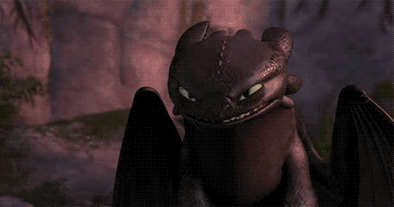
I really like the idea of the roles being switched!
Instead of an injured dragon befriending a human, an injured human befriends a dragon.
This no doubt takes place during the times where humans and dragons are still fighting.
Toothless is still the last of his kind, an elusive species.
You've heard of dragons, you've seen what they can do.
Many vikings tell you to fear them.
You didn't believe them until you were attacked.
You met Toothless as you were hiding from dragons who attacked you.
The Night Fury no doubt smelled your blood from your wounds.
You aren't injured too bad but certainly can't make it back home.
Not with the dragons in the area.
You aren't sure what to think when you see a Night Fury attack the dragons around you.
Toothless sustains some injuries but for the most part is fine.
You fear for your life when the Night Fury approaches you.
Both of you are covered in blood, the attackers are gone.
His eyes are in slits for a moment but he notices you're harmless.
Weak, even.
You could be easy prey.
Instead, the Night Fury doesn't kill you.
Instead he nudges you softly, maybe even tries to clean your wounds.
This Night Fury would be more scared of you than you are of him.
He isn't hungry, he isn't scared, he just seems curious... concerned.
You keep staying still, even as the dragon lays beside you to watch you.
Since Hiccup didn't find Toothless in this you would be the one to give him such a name.
Maybe as you heal more you fed him, allowing Toothless to show his retractable teeth.
The cool thing about this version of Toothless is definitely his flight.
He doesn't need anyone to fly, he's a regular Night Fury.
Yet despite this the dragon befriends you, an injured human.
He doesn't eat humans, it's actually not in the Night Fury diet (Look at the Night Fury article on the wiki)
So he isn't interested in eating you.
This would explain why he chooses to protect you instead.
The fact you're both "harmless" is what makes you able to relax.
That is until Toothless decides to take you away.
After all, you can't be safe here.
Toothless means well when he tosses you onto his back and flies to the cave he usually resides in.
The dragon hates that you give him the cold shoulder afterwards.
He brings you back all sorts of food to care for you.
He wants his human friend to heal.
He feels you're being hunted just as much as him.
You don't harm him because of a few reasons.
You wouldn't be able to go home... and you are admittedly attached to this dragon as your only friend and savior.
This is what makes you accept the supplies you're given.
You even allow Toothless to cuddle around you.
The issue is the dragon never lets you leave.
Nothing gets in the den, nothing gets out.
Toothless has taken the role of your protector.
Your family may think you've been killed.
You haven't.
In fact, you're really safe.
Toothless, as a Night Fury, is intelligent and powerful.
He understands your social queues and gets you what you need.
If you tried to leave then the dragon forces you back in the den.
If he lets you go... you'll die.
Dragons who try to sneak up on you are quickly attacked by Toothless.
Night Furies don't eat other dragons, but that doesn't stop Toothless from tearing into them.
Toothless washes off the blood of his kills before bounding to you.
Yet you know what he's done as you can smell the metallic smell on his scales and breath.
Toothless is loyal and will protect you no matter what it takes.
Why should you even go home? Home won't accept you anymore for having a dragon...
It's just you and Toothless now.
#yandere how to train your dragon#yandere httyd#yandere toothless#yandere dragon#overprotective dragon#platonic yandere
472 notes
·
View notes
Text
The Fall from the Heavens (34)
[ canon • Aemond x Strong • niece female ]
[ warnings: sex content, smut, angst, mention of killing a lot of people, catching others having sex ]

[ description: A cool distance turns into friendship and more when two children see that they can find refuge and understanding in each other. However, naïve dreams collide with the reality in which every event has consequences and what once could have been love becomes a dark, newly painful obsession. Angst, sexual tension, obsession, violence, madness, very dark Aemond. ]
The story in this series is an alternate reality from the oneshot Stay and love, leave and die, in which Aemond reads the letters his niece has sent to him over the years. They are the same characters and it shows what would have happened between them − I have changed the background story from their childhood slightly for the sake of the plot.
Characters & Series Moodboard
Lady Strong Moodboard
Aemond & Lady Strong Moodboard
Aemond & Lady Strong Childhood
* English is not my first language. Please, do not repost. Enjoy! *
Next chapters: Masterlist
_____
It seemed to him that never before in his life had he felt such fury as he did that evening when an attempt was made to poison his wife. He ordered all the servants to assemble in the hall, and then watched as one by one they tasted the wine that had been prepared for the supper for his wife and their cousin.
Some of them began to sob, and some of them were clearly unaware of what was happening − however, he decided that he couldn't take any risks, and soon they were all lying on the ground, looking like terrifying monsters from nightmares.
Their eyes bulging and red, their mouths full of blood and foam, their skin at once purple and pale.
He ordered the guards to watch over his and his cousin's chambers throughout the night and to bring fruits and other things to eat that could not be poisoned.
They had to manage in this way until they questioned and found new servants, whom he was going to choose himself.
As he walked into his quarters, he saw Baela lying on his bed in the darkness, his wife snuggled into her, immersed in a restless sleep.
"− she just fell asleep −" She whispered, lifting herself to sit up, trying to do it quietly and slowly so as not to wake her.
He hummed under his breath at her words and nodded.
"− you may return to your chamber now − I have assigned you guards from King's Landing − they will watch over your safety all night −" He replied, wishing she would just leave them alone at last.
Baela stepped around him and left without another word.
He sighed heavily as he walked over to the bed and lay down beside her, pulling his eye patch off his eye beforehand, feeling the pain in his eye socket due to the stress − his heart squeezed as her body instantly clung to his, recognising him, her hands tightened on his leather tunic.
"− uncle −" She muttered, lifting the dreamy gaze of her eyes to him. He kissed the top of her head, stroking her hair with his palm, hushing her.
"− shhh, my love − sleep − no one will threaten you anymore −"
"− are they dead? −" She asked quietly, and he swallowed hard.
"− yes, my love −"
"− all of them? −"
"− yes −"
"− and what about Alys? −"
"− her life belongs to you −"
"− thank you −" She whispered tenderly.
He swallowed hard, feeling the anger and rage slowly begin to leave him, giving place to his horror and disbelief.
"− embrace me, Rhaenys −"
He sighed as her small arms embraced him tightly at the waist, her face snuggled into the hollow of his neck, her legs entwined with his. He sank his hand into her hair, drawing her close, feeling the scent of vanilla fill his lungs wonderfully.
His wife and his child were alive and safe in his arms.
"− how did you know? −" He asked quietly, although some part of him knew the answer.
"− she told me − she warned me again −"
He sighed heavily and kissed her forehead again, her body warm and familiar, his.
"− I could have lost you − you and the baby − I thought we were safe here − but I promise no one threatens you anymore − I will choose new servants myself −" He whispered and she nodded wordlessly, snuggling into him as if she wanted to melt into one with him.
His hand slid down her waist between them and stopped at her womb.
He thought he wanted to tell her.
He wanted her to know that whatever she brings out into this world, it would make him happy and grateful towards her.
"− I will love our offspring − even if a little girl with your dark hair is born − I will love her because she will be my beloved wife's gift to me and our kingdom −" He whispered, imagining in the back of his mind their daughter so similar to her with his violet eyes, smiling in the same wonderful way as her.
How could he not love her?
His niece's words snapped him out of his reverie.
"− I want to give you seven children − as many as there are gods −" She murmured, stroking his hand with hers. He involuntarily snorted at her words.
"− after this, will you stop letting me between your thighs? −" He asked lowly and heard her sigh.
He knew she was smiling.
"− I fear no force will stop my uncle from reaching for what he desires −" She cooed, lifting her head, meeting the amused look in his eye.
Little tease.
"Indeed."
He swallowed quietly, coming up with an idea that seemed mad to him at first.
What if they had both decided to stay in Harrenhal?
Then they would not be prisoners of any family, neither of them would feel threatened, stranded.
The fortress was theirs, they could do what they wanted with it − they could live in it.
He thought he wanted that for them.
Peace and quiet so she could carry his child in her womb in peace.
"Let us not return to King's Landing or Dragonstone." He whispered. "Let us stay in Harrenhal. Let us create our own legacy. Give birth to our child here. Neither of us will feel like prisoners then."
She blinked, completely taken aback by his words. She swallowed quietly, thinking hard, only to lift the warm gaze of her bright eyes to him again a moment later.
"Very well. It's my desire too." She said quietly and touched his cheek with her palm, running her fingers over his jaw. He closed his eye and let the air out loudly − a hiss broke from his lips as he grasped the place where the sapphire now glittered in his eye socket with his hand, feeling that piercing, burning pain in his skull again.
It felt like someone had hit his head with a hammer.
"− uncle? −" She muttered terrified, touching his shoulder, but he just shook his head.
"− it will pass − it always passes −"
"− is it your eye? − does it cause you pain? −" She asked tenderly, worried and concerned, her large eyes open wide in horror at his condition.
For a moment he felt that the pain had taken away his speech, so he just shook his head, letting her know that he just needed to rest for a while.
"− should I call the maester? −"
"− no −" He whispered with difficulty.
He lay down on his back, still keeping his hand over his eye, breathing deeply, reminding himself that this had always helped him.
He realised that since his niece had come back into his life the pains in his eye socket had stopped as if by magic − before, for eight years they had tormented him notoriously, most at times when he was angry or frightened.
It had been months since he had felt as much fear as he did that evening.
"− can I do anything to relieve you? −" She asked helplessly, sitting beside him, her hand stroking his shoulder reassuringly.
"− no − lie down beside me and embrace me − I need to calm down −" He muttered, and after a moment her body was already beside his, her head clinging to his chest where his heart was beating.
They lay like this in silence, not speaking for a long time, her fingers stroking his free hand lying on his stomach. He concentrated only on that − on her presence, on the warmth of her body, on her scent, on her touch, and he felt the pain become less and less stinging, fading further and further, relaxing his tense muscles.
They both finally fell asleep from exhaustion.
He spent the next few days selecting new servants. He had them brought from villages independent of Lord Strong, warning them that they were to be loyal only to him and his wife, on pain of losing their heads.
He ordered his guards to watch them closely and supervise how the food was prepared, lest someone tried to poison his wife or his cousin again.
Although impatient and concerned that Lord Strong had sunk to the ground, apart from that, he felt this relaxed and content for the first time in his life.
His wife was at his side of her own desire, free and thirsting for his presence.
He felt as he had when they were children − now she too sought his closeness, the touch of his hand, the embrace of his arms at the most ordinary, prosaic things she shared with him every day.
At night, too, she was able to show him how great her longing for his closeness was, even though she had him at her fingertips − although he took care of her devotedly in the evening, he could feel her fingers trailing over his face, immersed in a deep sleep.
He purred then, involuntarily cuddling her warm, soft body into his, entwined with his legs. His breath grew heavier, his senses sharpened as he felt her full, soft lips place tentative, gentle kisses on his chest, his cock pulsed and quivered as her fingers traveled up and down it in slow, steady strokes.
"− my wife can't fall asleep? −" He whispered in a hoarse voice, grasping her plushy thigh with his hand, putting it around his waist, pulling her closer to him. She squirmed as his free hand gave her an encouraging, short smack on her buttock, his sweet punishment for rousing him from the peaceful, deep sleep he had only experienced at her side.
He softened this aggressive gesture by seeking her lips in the darkness, joining her in a warm, lazy kiss full of their tongues and sticky moisture, sighing contentedly as her small, delicate hand clamped down on his root, squeezing and rubbing it skilfully so as not to cause him pain.
It took her embarrassingly little time to make him completely hard and ready to possess her − he could feel that his own wetness was already dripping from the thick, pink head of his erection, proof of how delighted he was that his own wife craved him so desperately.
Had another woman been lying next to him, he would have felt cornered and humiliated, as if she wanted to deliberately deprive him of control and dominate him − with her, however, with his tender friend, with his sweet wife, he felt at peace, desired and assured.
A murmur escaped his lips as her fingers guided his long erection against the heat between her thighs − they both sighed as he pushed against her puffy, leaking slit with a soft thrust of his hips, feeling his heart pounding like mad, already fully awake despite hardly opening his eyes.
Her little cunt offered him slight resistance at first, moist and tight − he opened her wide at the thickest part of her length, drawing a sweet, girlish cry of exertion from her lips, her fingers clenched on his back, her breasts, her hard nipples pressed against his bare, sweaty chest.
They were so close with each other.
"− shhh − there you go −" He whispered, thrusting deep between her swollen, fleshy walls pulsing with desire, welcoming him home, as usual wonderfully warm, making him feel safe.
Nowhere was he so comfortable, nowhere could he find a more wonderful refuge than deep inside her.
He didn't have the strength to pretend in front of her any longer, recognising also that there was no reason to do so − he allowed himself to be more vocal than usual, his panting and groans low and filled with relief.
His hand clamped down on her plump buttock, spreading her thighs wider, pounding into her delicate flesh with loud splats of her wetness and his seed that he had filled her with the evening before.
"− uncle − so good − make love to me −" She mumbled innocently as if in a dream, kissing again and again his chest, his neck, trailing her fingers along his back, waist and buttocks making a wonderful hot shiver run through him − his achingly swollen cock expressed his contentment at her closeness and treatments as it twitched hard inside her, her walls sucking it and clamping down on it greedily, soaking him wet.
"− f-fuck −" He breathed out and groaned low with pleasure as her puffy, wet lips clamped around his nipple, her tongue swirling around it making a wave of tickling pleasure run down his lower abdomen, causing him to quicken his pace, pressing his face to the hollow of her neck, clutching her fragrant flesh to his.
"− mghmm −" She whimpered as he tightened his fingers on her breast, wanting to feel, as he usually did for a moment before reaching his peak, how perfectly it fitted the shape of his hand, in response to what she was doing pressing and teasing her nipple with his thumb.
He didn't know when his niece was shaken by a wave of pleasure − her fleshy walls squeezing his soaked cock were enough to make his spend fill her again with his loud sigh of delight that left him speechless.
He kissed her forehead, feeling fulfilled and at peace, his heart and body filled with a wonderful, hot emotion, his affection for her, his devotion, his care, his eternal desire that could not be satisfied.
He knew she felt the same.
They both breathed loudly, trying to calm themselves, stroking their naked bodies, sweaty from the sudden exertion. He murmured lowly as he felt her palms travel up his buttocks and rise higher along his waist making him feel goosebumps.
If Maris Baratheon had touched him in this way, he would have felt discomfort − he would have thought that such behaviour was unworthy of a lady or wife, and he would have pushed her away, frustrated and discouraged.
Yet it was his childhood friend hands that stroked and caressed his body, it was her lips that roamed his bare flesh, giving him pleasure and a sense that she desired him as much as he desired her, that his scar and what had happened to his eye had never crossed him out in her eyes as neither her husband nor her lover.
This realisation, her care and the warmth of her embrace calmed him.
He fell asleep again with his face snuggled into her hair, her naked body pressed against his, his soft erection deep inside her.
It didn't bother her − on the contrary, he got the impression that it wasn't just about fulfilment. She, like him, enjoyed the feeling of him being deep inside her, of feeling him, of them being one flesh.
Woman and man couldn't have been more connected.
The following nights that he spent at her side were filled with their intimacy and peaceful, deep sleep. He only awoke in the morning, struggling to tear himself away from her, assuring her that he would soon return to her by placing warm, lingering kisses on her bare shoulders and neck, before getting up to attend to his duties.
After what had happened he sent Aegon a letter, and it took several days for his reply to reach Harrenhal. As it turned out, according to his suspicions, their grandfather was still acting behind their backs, and Aegon decided to put an end to it by locking him in his chamber, allowing only his most trusted servants and guards to approach him.
Several people carrying information out of the Red Keep, which was apparently then passed on to Larys, lost their heads, and their deaths were a warning to others.
It was Aegon Targaryen, not Otto Hightower, who was King.
For now.
Baela chose not to leave Harrenhal, horrified by what had happened, clearly wanting to watch over his wife − her presence frustrated him, but he couldn't underestimate her contribution to her safety all the more so when he had other things to attend to and wanted to make sure his niece or their child was in no danger.
"− it's slowly becoming visible −" She whispered to herself, stroking her belly. He looked up at her from over the parchments, snapped out of his reverie and hummed under his breath, extending his hand to her. True to her words, as she approached him and he placed his hand on her lower abdomen, he felt it swell, though it was barely noticeable.
"− indeed −" He murmured, for some reason clearly pleased. He leaned down and nestled his face into her belly, sighing heavily, her hands enclosing him in a tender embrace.
They both shuddered and pulled away from each other, hearing a roar in the skies. He stood up, walking over to the window, seeing a black blur approaching towards Harrenhal, gliding between the clouds, however, he was unable to recognise who it was.
Only after a while did he recognise the familiar silhouette and sighed heavily, looking at his wife resentfully, as if it was her fault that her older brother had decided to fly to Harrenhal.
He, his wife and Baela came out to meet him. Jace was visibly upset, as he jumped down from his saddle he quickly ran to his sister and locked her in his embrace.
"− are you hurt? − I arrived as soon as we received the message − our mother is terrified −"
"− I'm well, brother −" She whispered and stroked his back. He pressed his lips together and swallowed hard his jealousy at the sight, looking away, clenching his hands folded behind his back into fists.
"− how could you let this happen? −" He heard his enraged voice pointed in his direction and looked at him warningly, hitting the wall of his cheek with his tongue.
His wife intervened, seeing the look on his face.
"− Jace − that's enough − in my condition I can't be upset −" She said impatiently, using this argument every time she wanted to shut down a discussion that was uncomfortable for her.
Her brother swallowed hard and nodded, trying to control himself.
"− mother sends me to personally make sure you are not in danger here −" He said finally, Baela snorted at his words, clearly offended.
"− I am here and I informed you about what happened − don't you trust me? −" She asked angrily − Jace looked at her, embarrassed that he had only just remembered her presence.
He thought with disapproval that he somehow felt sorry for his cousin.
He, though eyeless and with a long scar on his face, was the only one for his wife.
It had always been that way and he knew no other feeling.
How humiliating must it have been when your future husband forgot you existed?
It was only when thinking about it that he reminded himself what he had seen a few days earlier and looked away, grinning mockingly.
He had left the fortress to meet his spies who had come across Larys Strong's trail − it turned out that he had been staying at one of the inns and then moved on to another place, paying everyone lavishly for their silence.
He felt he had him at his fingertips, that he would soon crush his head.
By the time he returned, it was late evening. Walking towards his chamber, he sighed heavily, running his hand over his face, tired and discouraged, comforting himself with the thought that his niece was waiting for him in bed, soft, warm and wet, that he would sink deep between her thighs and find relief in her loving arms.
He did not understand how married couples could sleep in separate chambers.
He would go mad if his wife spent her nights in quarters other than his.
He stopped, snapped out of his reverie by hearing sounds he knew well − he furrowed his brow, thinking with rage that some guard had just fucked a servant girl in an empty chamber, instead of doing his duty and keeping an eye on his wife's safety.
He burst in like a thunderstorm, the loud moans, panting and slapping of skin against skin continuing for a moment before Baela's eyes lying under the broad, muscular man found his in the darkness.
Something akin to a squeal of fear broke from her lips, her palms tightening on the man's back as he turned over his shoulder and turned pale at the sight of him.
"− Y-Your Grace − I −"
He turned, shocked, and walked away, looking over his shoulder, hearing them both curse under their breath and snorted, a mocking smirk on his face.
So that's what it looked like, he thought with amusement.
For some reason, what he saw made him feel better − his wife was already asleep when he walked into their chamber. He watched her peaceful face as he undressed and lay down on top of her, her eyelids parted and her body trembled all over in fear that someone had touched her.
"− shhh −" He whispered, pressing her naked body against the bed − he was delighted to see that, in an involuntary, natural response, her thighs spread wide before him, her fingers snuggling him close.
"− yes −" She mumbled, still half asleep, and he forced his way deep into her hot interior with one quiet, slow thrust of his hips.
She moaned and sighed beneath him, delighted that he was sliding into her without haste, clearly more focused on feeling her well than on experiencing fulfilment as quickly as possible.
He had long since learned what it meant to truly enjoy her body.
He thought as he threw her legs over his shoulders, as he leaned down and locked her breasts between his fingers, listening to the way his cock opened her sweet cunt with the loud clicks of her wetness, that he had something that neither Baela nor Jace had.
He loved and was loved.
That realisation spread through his body like a warm, wonderful wave, his lips, swollen with desire, joined hers, her fingers tightened in his hair. He quickened his pace, slamming into her with ever louder moans of pleasure, knowing exactly what he was doing to her and what was about to happen.
"− n-no − no, it's fresh bedding −" She mumbled, simultaneously trying to push him away while he pulled her to himself, her puffy nipples rubbing against his chest with each of his rough pushes.
"− why the fuck should I care −" He sneered, thrusting into her again and again with deep, sticky thrusts of his fat erection, feeling her moist, hot walls squeeze it with pleasure against her pleas.
Her response to his brutal thrusts was her helpless, girlish cry, her lips parted in despair knowing what was coming, her slick cunt beginning to leak from her moisture making him slam into her with loud, sticky splats each time.
"− ah − mghmm − u-uncle −" She mewled, digging her fingers into the skin of his shoulders, tilting her head back, letting go at last, allowing what he wanted to happen to happen.
"− thaaat's it, theere we go − that's my girl −" He breathed out, reaching his peak inside her just as he felt the wave of her moisture run down her buttocks along with her fulfillment.
"− u-uh − no − it's all wet now −" She mumbled out, panting heavily, unsatisfied and unhappy.
"− your husband will take pity on you and let you sleep on his dry part of the bed − hm? −" He muttered with a grin, her hand slapping his chest with regret mixed with amusement.
"− you do it on purpose −"
"− indeed −" He hummed and turned on his side with her, looking with a smirk of satisfaction at the large, colourless stain that had formed where her buttocks had previously lain, tightly covering their bodies with thick furs.
Neither she nor their child could get cold.
"− sleep −" He commanded and snuggled her face into his neck, sighing contentedly.
He thought back to that night, watching as Jace walked up to his betrothed and embraced her, which she reciprocated.
He thought, looking at them, that they were pathetic.
#aemond fic#aemond targaryen#aemond fanfiction#hotd aemond#canon aemond#aemond smut#aemond fanfic#aemond one eye#prince aemond#prince aemond targaryen#aemond targaryen smut#aemond targaryen angst#aemond angst#aemond x original female character#aemond x original character#aemond x oc#aemond x female#aemond x female character#hotd fanfic#hotd fanfiction#hotd fic#hotd smut#hotd angst#house of the dragon fanfiction#aemond x wife#aemond x niece#ewan mitchell smut#ewan mitchell angst#ewan mitchell fanfiction#ewan mitchell fanfic
246 notes
·
View notes
Text
I’m fascinated by how variations of Sea Power's “Want to Be Free (Remix)” provide a musical theme for death and endings that follows Harry and his foils throughout Disco Elysium.
The first place you hear it is as “The Field Autopsy” while inspecting the Hanged Man’s body. It's barely recognizable as the original song, though. It's sluggish and muddy and bilious. The piano melody has been lowered and sustained to an ominous funereal organ and combined with deep strings. A lilting viola line in the lush layers of the original "Want to Be Free" is isolated here and contrasts with the low organ, rising like the stench off a corpse. If you do the autopsy first thing as Kim suggests, Harry – freshly, grotesquely awakened from his apocalyptic bender – is not in a much better state than a corpse himself.
The music underscores a visceral scene of death and decay, our introduction to the Hanged Man, the first of Harry's foils. Both Harry and Lely are agents of state-sponsored violence as a cop and mercenary, respectively. They bear similar physical scars from the neglect of the systems they grew up in. They both desperately want to escape the horrorshow of their lives, using drugs and dark fantasies to cope with the terrible things they see and do but finding little more than self-destruction in the nihilism. The Bloated Corpse of a Drunk taking the Hanged Man's place in Harry's first night dream makes their connection explicit: you should be dead, Harry. This may as well have been you.
The next place you hear a variant of "Want to Be Free" is in the washerwoman's shack in the fishing village. “Live With Me” is wistful and melancholic. The gentle piano and cooing vocals evoke the wind and waves on the bay, an escape calling outside the salt-rimed shack. But this is a place of death, or at least its potential, as the return of the high viola from "The Field Autopsy" reminds us. This is where Ruby hid when Harry's arrival made her fear for her life, where she contemplated killing herself if things got even worse. This is where Harry can end up if no one vouches for him at the RCM tribunal finale, where his wounds will grow infected without medical care, where there is little left to do but return to drinking and wait to die.
But true to the song title, the shack also offers Harry the possibility of learning to with himself as he emerges from his bender. Here is a mirror free from the damage and trauma of attempting to destroy himself where he can reflect on who he was and who he wants to become. He can choose to keep or let go of his past coping/defense mechanisms like his facial hair and The Expression. He can choose to embrace or reject the self-defeating fantasy of fascism. The shack marks a midpoint of the game, when the hangover has worn off but before the case is closed. So "Live With Me" scores the balance between potential endings: abandonment or acceptance, relapse or recovery, death or life. Harry breathes in the sea air, breathes it back out, and takes another step.
I didn’t realize this until a recent replay, but “Live With Me” also plays when you visit the Working Class Woman to notify her of her husband’s death. Since this is an optional sidequest, I understand why they didn't create original music for it. But they didn't reuse "Rue de Saint-Gislaine", the song for the rest of the Capeside Apartments (including the Smoker on the Balcony's apartment when you talk to the Sunday Friend). The Working Class Husband is another mirror for Harry who has met his end, and "Live With Me" plays to mourn him.
Victor Méjean died from an accident while inebriated, a fate that also could have befallen Harry on a previous drinking binge. The striking thing about Victor's death is how easily he could have been overlooked and forgotten. He died at the end of a pier in a fenced off, abandoned part of town. His wife wasn't concerned about his days-long absence. It's only by virtue of Can Opening and Jamrock Shuffling that Harry will know about or find him. Victor literally and figuratively died slipping through the cracks – of the rotted boardwalk, yes, but also of any sort of social safety net. This is what happens to alcoholics in Revachol. This is what will happen to Harry if he continues drinking and hasn't built his own personal safety net with Kim or Cuno to prevent the RCM from abandoning him. As Harry informs Billie of her husband's death, it's only natural for him to think of his own possible endings, and the soundtrack reflects that.
The final version of the song you hear is “Burn, Baby, Burn” blasting from Sad FM on the boat ride to the Sea Fortress to find the Hanged Man's killer and Harry's last dark reflection: Dros, The Deserter. Dros shares Harry's penchant for clinging to political ideology to give meaning to his life and obsessing over women he can't be with. He lives in bitter isolation, refusing to move beyond the failures of the past, his personal shortcomings and the evils of the world alike. He's emblematic of yet another possible outcome for Harry: not literal death, but despair-induced stagnation that leaves one living like a ghost in the mortal realm.
By the time Harry gets in the boat to the island, his fate at the end of the game is set. The RCM (specifically Jean) has all they need to decide whether to accept or abandon their prodigal lieutenant-yefreitor. Should his former partners leave him, Harry can return to the shack and the circle of drunks who have also given up on life. Or he can return to the island, where he would take Dros' place as the creepy old man haunting the fortress, scaring children, and staring at the mainland with longing and resentment. But even if Harry returns with his unit to Jamrock, simply resuming his old life will not keep him from returning to the depths of despair. The RCM broke him; the RCM will not save him. Neither outcome helps Harry become a person he truly wants to live with.
"Want to be free/It will last forever/Eternally," croons the boombox on the boat. The lyrics echo the self destruction that Harry sought before the game's events: freedom forever from pain, the ultimate release of death. At least that's what the Ancient Reptilian Brain would see in those words. But there's tension in the lyrics as the desire for freedom and exhortations to "burn, baby, burn" repeat. The bridge offers an alternative vision of verdure not consumed by the disco inferno: "And the trees are green and overhanging/Feather-light, free, and everlasting." Perhaps a less moribund future exists for Harry, even if only in the next world, as a new person.
#disco elysium#disco elysium spoilers#disco elysium meta#disco elucidations#sea power#i know tommy le homme sings lyrics from “want to be free” but i wanted to focus on the soundtrack here#someone else can do that analysis lol#music is not my bailiwick so please correct me if i got any instruments or terms wrong#god this took me forever to write#and i have a whole nother different music and de post still in drafts too#whoopsie doo#my disco posting is never done
162 notes
·
View notes
Text
I see many able-bodied people and non-photosensitive people confused as to why the Epilepsy Community on Tumblr refer to the Spider-verse Franchise as being inherently ableist. I can understand that if you are not familiar with the term, you may find this disconcerting. The film is not actively saying that disabled people are bad, nor do I think that they are making an active decision to harm disabled people. I do not think that they are making a film with the deliberate purpose of killing disabled people!
However, the active choices they make (e.g. not adhering to the rule that states that a flash rate of 3 - 30 per second is dangerous, and to avoid high contrasting patterns) are those which mean that Photosensitive People are barred from seeing the movie. This is a form of social discrimination. No, please, hear me out!
Scope, a leading charity for disabled people defines ableism as:
"A word for unfairly favouring non-disabled people. Ableism means prioritising the needs of non-disabled people. In an ableist society, it's assumed that the “normal” way to live is as a non-disabled person. It is ableist to believe that non-disabled people are more valuable to society than disabled people."
This is what the creators do. They unfairly assume that disabled people will have no interest in watching their film. They unfairly assume that the public will all pass on through word of mouth that the film is dangerous to watch for photosensitive people. It unfairly assumes that, because the majority of its audience will be safe watching it, those who are not safe do not matter as viewers or as people. It unfairly assumes that there Afro-latine People, Black People, Latine People, Jewish People, Women – the minorities the film chooses to represent – are all able-bodied and that if there do happen to be any people within those demographics that are also photosensitive, then they have no interest to see other parts of themselves represented on the screen in the same way.
Disabled people already feel incredibly isolated by society. People, especially children, with epilepsy are often barred from social events. They cannot attend nightclubs, concerts, sleepovers, school trips, long haul holidays and so on. On bright sunny days, my incredibly Photosensitive Mother cannot even drive the car because the flashes of sunlight between the leaves of trees will give her a migraine that will take days to recover from.
Therefore, when a company knows full well that their film is going to be talked about amongst the general public, that it is going to be a moment of cultural importance, to make a series of creative choices that knowingly bar disabled people from having this experience is a form of ableism.
Ableism is not always obvious. In fact, it usually is not. Why? Because ableism is focused on leaving disabled people at home. It is focused on pushing us to the side, and making sure we are never heard from again. And in this case, it does take this to the extreme. Exposure to this film can indeed cause a Photosensitive person to die. This is not an exaggeration.
3000 people a year die in the USA from epileptic seizures.
And as I have said before, this is not a case of us asking to be allowed to sit at the table. We are not asking for them to introduce an epileptic spider person! We are simply asking to not be shot at if we try to enter the room, and asking that you please listen to us when we explain that pointing a loaded gun at a disabled person who tries to interact with you, is, in actual fact, quite an ableist thing to do.
#actually epileptic#actually disabled#spider-man#into the spiderverse#across the spiderverse#spiderverse#itsv#atsv#marvel
853 notes
·
View notes
Text
Clarifications about Death and Taking Your Own Life
My last post about death (part 2) raised many questions about suicide and why it's different and "wrong" compared to other causes of death, such as being brutally killed. In this post, I want to address those questions.
1. If you get brutally killed, is it chosen by our souls?
Yes. As I mentioned, when and how you die is decided by you on a soul level. Even if a person dies in a horrible way at the hands of others, it was chosen by that person's soul. I understand why this is hard to comprehend and accept. When I see news about a child being brutally killed by their parents, my first reaction is pain, horror, sadness, and anger. It's natural. But let's return to the question: why would someone choose (on a soul level) to die like that?
The answer is a matter of perspective. From our human perspective, this death is unfathomable. But from the soul's perspective, it makes sense. Everything in our life is created by us, either consciously, subconsciously, or on a soul level. As I mentioned in my first post, some traumatic situations that we would never consciously choose to manifest are indeed chosen by our souls to be experienced. Death is also created by your soul because it serves the agenda of that soul. What is the agenda of the soul of a child brutally murdered by their parents? Why did their soul choose to die like that?
I can't provide a definitive answer since I don't know the agendas of each specific soul. But when I asked my soul and God to help me understand why such deaths are chosen by souls, I received this answer:
When a child (or anyone) dies in such a way, the agenda of that soul could be:
- A selfless agenda to serve others. In this case, it would be to show other people how our society is flawed and make them face the problems of our world. It's a powerful message and agenda that helps others awaken. When we see news about an innocent child being brutally murdered, we experience pain. This pain shows that this is not who we are. We are beings of love. It also makes you wonder why our society creates "monsters" who kill their own children or anyone. It's about taking responsibility for our creations and realizing that all these criminals are byproducts of the current system that the majority created. Do you think that if we lived in a peaceful society where everyone feels safe, loved, equal, and has their needs met, anyone would desire to hurt others? No, because we are all One. We are individuations of God. When we hurt others, we hurt ourselves. When we see people being killed, mutilated, or tortured, the purpose behind it is to show that the way we do things on this planet doesn't work. Society needs to change. All the people who die in such horrible ways, their souls chose to show us that. The agenda is to help us wake up through pain.
- Another agenda souls might have when going through traumatic events and horrible deaths is to experience forgiveness, empathy, compassion, and resilience. Experiencing trauma helps a soul better understand the suffering of others. It fosters empathy. Such deep compassion can be essential for a soul's growth and its ability to help others. When a soul wants to experience forgiveness, it chooses life events (and even death) that create a context for such forgiveness. How can you forgive when there is nothing and no one to forgive? A soul would create a contract with another soul to experience forgiveness by being hurt in the physical realm. If a soul chooses to experience its own power and limitlessness, it may create very challenging and traumatic events to see that even the most horrible pain and situations don't destroy it. Even dying brutally, you realize it didn't destroy you. You keep on living, realizing that your body is fragile, but the Real You never dies and never suffers.
Also, check this video to understand this point better.
I want to add that when people die in such horrible ways, they experience such encompassing love in the spiritual realm that it helps them heal. Eventually, such souls remember why they chose to die like that and see perfection in everything, especially their death, because it served their agenda.
Some people say that thinking others chose to go through such suffering is blaming the victims. But I don't see it that way. I'm not blaming them; I honor them. I see beyond the simple fact of being brutally killed. I see the agenda behind their choice to die like that. I admire such souls for choosing such life paths. And I feel happy for them because I know they are now in a place of pure love and light. They are so cared for and taken care of. They are Home with God.
2. Another question I want to answer: isn’t being murdered and killed considered dying before your life is completed?
No. Your physical life completion isn’t defined by your biological clock and age. It’s defined by whether you have accomplished everything you wanted to on a soul level. This decision is made by your soul, not your mind. Dying very early on (e.g., in childhood) or being killed by someone is perfectly timed by your soul. Even if it seems that this person died too early and without accomplishing much, it’s only our limited human perspective. Their soul accomplished everything it wanted and it was time to move on to the spiritual realm.
3. Perhaps the most asked question: isn’t suicide also chosen by the soul? Why is it different and worse than being killed?
First of all, it's not "worse" or "better." These are human terms. In this case, it's about choosing paths that suit your agenda and goals and those that don't. As I mentioned in the original post, death must meet two conditions to be classified as suicide:
- You must be aware of what you are doing, making a conscious decision to die.
- You must choose to die to escape life rather than complete it.
When people kill themselves, they mostly do it in hopes of escaping their lives. It's not wrong or bad; it's just counterproductive. You don't escape anything. It's merely a temporary escape into the spiritual realm, leading to a rebirth where the same challenges reemerge. It doesn't happen instantly.
When a person kills themselves, they enter the spiritual realm where they heal from all the pain and suffering they went through. They spend as long as they need there. They remember who they truly are (God) and why they chose to experience such challenges. They remember their agenda. Nobody forces them to go through such challenges; it's always free will. If a soul decides it hasn't accomplished its agenda, it returns to the physical realm (when ready) to face the same challenges again.
Suicide is never chosen by the soul. It's a decision made by your human self in hopes of escaping life. It's an untimely death because they haven't accomplished what they wanted. They escaped it.
Some people ask, what if the soul realizes it made a mistake and doesn't want to go through the same challenges? Our human minds can make mistakes, but our souls are pure essence of God. Do you think God makes mistakes? Your soul always knows what it's doing. It never chooses challenges it thinks are impossible for you to handle. If you're facing challenges, it means you're capable of dealing with them. You've placed such situations (unconsciously) to find a gift in them. Manifesting and using the LOA is one way to deal with difficult situations. Seeing deeper meaning behind every challenge is another. But killing yourself means deciding you can't deal with the situation and there's no other way. But there are always ways. You are a powerful creator and you can deal with anything. Nothing can destroy you. You will have as many reincarnations as needed to accept your limitlessness, power, and immortality.
I'm having these conversations with you to help expand your mind. To elevate your thinking from a human perspective to a soul perspective. The human perspective is limiting. But when you look at your life from a soul perspective, you see perfection in everything, especially in traumatic experiences. You are not human; you are having a human experience.
I hope this post helped you to understand better such complex topics as death and suicide. If you have more questions, I’m always open to them 🙏
80 notes
·
View notes
Text
I am disappointed with the way the show portrayed Blood and Cheese
[spoilers ahead for ep 2x01]
First of all, I fully understand the absence of Maelor and I’m not even mad about that. The choice between the two twins aka “which one is the boy” is good imo. Also, Phia is a great actress and I don’t blame her one bit for what happened to her character. She did the best she could’ve with what she was given. But the execution of all this? Meh.
1. Why did Helaena choose Jaehaerys, instead of Jaehaera? It would’ve made MUCH MORE SENSE for her to choose Jaehaera because she’s the girl. And then B&C would’ve killed the other twin, Jaehaerys, because they knew she would not give up the heir to the throne, king Aegon’s only son. Her choosing Jaehaerys takes away her guilt of living next to the child she named to die.
2. Why was the death of Jaehaerys so off screen? I’m not saying I wanted to see a six year old child be beheaded, in all it’s gory and graphic details, but I wish Helaena and Jaehaera were there to witness it. It was important for them to see it happening. It could’ve been just a silhouette, a shadow on the wall, or just Haleana’s expression of horror. Instead, she just runs away. It’s still sad, obviously, in its own way, that she wasn’t there for her son in his last moments, but again, that takes away from her guilt and eventual downfall into madness.
3. Why the fuck was this whole thing played off as a misunderstanding/accident? Of course the creators wanted to make Daemon look less evil, by making him tell B&C to kill Aemond instead. And I kinda liked the addition of one of them saying “what if we don’t find him?” and I expected Daemon to say something like “You can kill another son” or whatever, but then it just FUCKING CUTS AWAY? And now have to INTERPRET STUFF? So that no one can hold Daemon accountable because “technically we never saw him say that in the show!☝️🤓” Fuck this.
4. The Alicole sex scene fucking ruined the whole scene. I was hoping, praying even, that the leaks of Alicole having sex while Blood & Cheese happens was just a rumor, a theory. But no. The creators fucking decided to make them have sex while this horrible incident happens. Someone in that writing room said “You know what? Let’s have Alicent and Criston do the nasty as Aegon’s six year old child is brutally murdered and Helaena is being traumatized for life! That seems like a great idea!” AND THEY WENT WITH IT. That addition was just so fucking unnecessary. What was the fucking point of putting that in? Wouldn’t it be great if Jacaerys heard of the death of Lucerys first and then ran to Rhaenyra on Dragonstone to tell her that his brother was fucking murdered, only to find Rhaenyra having sex with Daemon? Like, why was Lucerys’ death so serious and tragic, and impactful, but then Jaehaerys’ death is overshadowed by Helaena running into her mother having sex with her lover? God, I’m so angry.
5. Helaena didn’t seem to be affected at all by the death of her son. “They killed the boy” and that’s IT? She didn’t cry her eyes out, didn’t scream, didn’t beg for B&C to kill her instead. She almost didn’t react at all. Her son, her baby, her six year old child, was just brutally fucking beheaded and the creators don’t even show her reacting to it? Rhaenyra showed more emotions when she found the clothes of her death son, and Helaena was like 🙁 when HER SON WAS BEING KILLED IN FRONT OF HER?? What the actual hell. And may I repeat, this is in NO WAY an attack on the actress, Phia. I think she still gave us an amazing performance, but it’s fucking obvious that the creators decided to go with the “oh well, she’s weird and distant, and cold and unemotional” narrative they made up. They won’t fucking allow her to grieve.
All those people writing that “Even GRRM was horrified by this scene!” or “This is gonna be like the Red Wedding!”… I was fucking lied to.
This whole sequence felt so short, and rushed, and unemotional… I am very disappointed, and sad. This was supposed to be one of the most important events of the entire Dance. They first actual innocent blood that was spilled. The event that led to Helaena going mad. The event that changed Aegon as a person and made him declare war on Rhaenyra and gave him motivation to repay Team Black for what they’ve done. It was supposed to be fucking important. And the show turned it into a four minute awfully paced scene with dumb additions and lots of unnecessary and easily avoidable changes.
#house of the dragon#hotd#hotd season 2#house of the dragon season 2#asoiaf#fire and blood#pro team green#team green#blood and cheese#b&c#helaena targaryen#aegon ii targaryen#prince jaehaerys#hotd season two#hotd s2#hotd 2x01#anti daemon targaryen#anti team black#hotd critical#pro helaena targaryen
58 notes
·
View notes
Text
Critical Role- Gods and Parents Parallels
One thing that pops up again and again in the Ruby Vanguard and Ludinus discourse about the gods is that the gods are angry because their children surpassed them. That the child must always surpass the parent, and that the gods not allowing that makes them unfair, against the natural order of things.
I see three issues with this, and they are all a little at odds with each other, so not sure which if any make the most sense.
The first is that the gods have already significantly stepped back from influencing Exandria, as a good parent should. In fact, much of the Ruby Vanguard, like Bor'dor and Lilliana, were radicalized because they felt abandoned, not because they felt the gods have overstepped. Same with a lot of Bells Hells - they have such vague feelings of the gods mostly because they have only felt them vaguely. The few times they've witnessed real overstep were when Ludinus forced their hand - the Dawnfather temple, what happened with Opal.
But most of the time, they don't usually force their will, don't demand obedience from those who choose not the believe, give vague hints. So in trying to give their children more free will, which those like Ludinus should see as a good thing, they come across as absent (a similar problem to the gods in the Percy Jackson series, where the parent issues are much more direct.) You're damned if you do, damned if you don't.
The second is that the rule that the child must "surpass" the parent only really works in a world where parents eventually age and die. But the gods... don't. And can't. Not naturally. Which is I suppose why Ludinus is so deadset on killing them.
But on top of that, even if one killed the gods and became top of the food chain, mortals still can't comprehend the infinite the way gods can. So in reality it's sort of impossible for mortals to surpass the gods except by becoming one, a process that we know is difficult and has a variety of complications. And even then, you don't actually surpass the gods - you just become one of them. You become what you despised, thinking you could do a better job, until you realize all the demands that position and responsibility brings. You could maybe do a better job, but in the process realize why it was so hard for your parents in the first place. Look at the Raven Queen. So either way, Ludinus's dream of mortals surpassing gods doesn't work.
Which leads to my third issue: Surpassing is not the point.
If we're really going to run with the parent-child parallels, the true sign of a child maturing is not them surpassing the parent - it's understanding them. It's seeing their flaws and forgiving them for it. To see them not as saviors or tyrants, but in their entirety as beings trying to do their best in imperfect circumstances. Doesn't mean you need to maintain a relationship with them as an adult if they really hurt you and continue to hurt you, but it allows you to better understand the past and forge a better future.
Now, the gods don't seem to think mortals CAN understand, and I think that is a flaw on their part. Mortals may not be able to understand the infinite, what it means to be responsible for and take care of entire domains of existence, to be so bound to your own rules you cannot break them. But mortals can, some more than others, understand trauma and family obligations and impossible choices. The Society of Primes may not have come about if the Primes made it more apparent what the Betrayers really are to them.
And this is where I hope Bells Hells can step in. Because they are among a select few living souls who have seen what happened in Aeor from the Primes' perspective. (4-Sided Dive mentions they did not witness what happened in Tengar and the epilogue, but everything else). And this group more than many can understand impossible choices and choosing one another, even when it could potentially hurt others.
If Bells Hells can prove to the gods that mortals are capable of appreciating them as flawed and respecting them anyway, that seeing their flaws even makes them love them more... perhaps that could lead to a healthier relationship between mortals and gods for all of Exandria. Not of tyrants nor of absence, but a happier medium.
EDIT: We in fact see this in Campaign 1, where Vax and Vex see the human faces of the Raven Queen and the Dawnfather - in the instances the gods have trusted mortals enough to show their human side, they have become more likable. But considering Aeor, it's easy to see why they don't trust easily.
(Of course this could go the totally opposite way and I could eat my words, but that's just where my head is at after Downfall. Imogen and Laudna in particular I think may become more fearful seeing what the gods do to threats to themselves and their domain. But we'll see).
#cr spoilers#critical role#cr campaign 3#cr downfall#downfall#cr discourse#cr meta#exandrian pantheon#critical role exandria#exandria#aeor#bells hells#ludinus da'leth
43 notes
·
View notes
Text
JADE CITY.
— dialogue prompts from jade city by fonda lee.
“what’s going on? you seem out of sorts tonight.”
“send me the bill for the damage. i’ll take care of it.”
“tell me, my friend. have you had any other trouble around here lately?”
“sitting out here alone? something the matter?”
“how am i still alive when they’re all dead?”
“what did you come for at this hour, anyway? spit it out.”
“you should have killed that man!”
“i fell asleep waiting for you, and in return you scare the shit out of me. where were you?”
“you’re the most important thing in the world to me.”
“i’ve forgotten the past. everything’s forgiven, now that you’re back.”
“ah, what to choose, pain or failure?”
“where are you taking me?”
“cancel the rest of the day’s meetings. i’ll be in my office.”
“wait here and don’t move until you’re called.”
“i’m sure you’re wondering why you’ve been brought here.”
“may i… ask a candid question?”
“i’ll wait for an answer, but not for long.”
“you have to pay attention every fucking second because i can’t always be there if there’s trouble, understand?”
“sometimes the old ways are not without wisdom.”
“can you drive? can you handle a gun?”
“i keep seeing you, but i don’t know your name.”
“do you have anything to drink? it’s still hot inside.”
“whatever it is you decide to do, i’ll support you. i’ve told you that before, and it hasn’t changed.”
“i’m afraid i’m paying you this visit out of a sense of great concern.”
“there needs to be a balance of power.”
“what do they think we are? hired thugs?”
“why the fuck are you here?”
“i knocked but you must not have heard me.”
“you look as if you could use a massage.”
“i visit here too often; it’s not safe for you.”
“i have a gun, and i know how to use it. i won’t be a burden. i can take care of myself.”
“we’ll talk about this later.”
“from now on, i’ll be sure to call out hello to you when i’m still well out of knife range.”
“what can i do to help?”
“if anyone tried to kill you, you deserved it.”
“what is wrong with you? you don’t know who you are anymore.”
“give me your blessing, or condemn me, but don’t wash your hands of me.”
“not ready to die yet. gonna quit while i’m ahead.”
“you work for me now, you understand?”
“i’m disappointed you didn’t accept my offer.”
“we can plan a wedding, a big one. pick a date. i was thinking soon—springtime, what do you think?”
“you can do anything else you want, but not this.”
“it’s not that i think you’re boring. it’s just that keeping watch over you isn’t all that exciting, you know.”
“and here i was, starting to think all our meetings were because you were working up to hitting on me.”
“where and how did you fuck up?”
“risk your own life how you like, but leave me alone to live mine.”
“i’m not a coward.”
“i’ve never asked you for anything, but i’m asking you now, to keep this secret.”
“you do a good job, you make a big impression, show just how valuable you can be—that’s when we talk for real.”
“you were fantastic out there tonight.”
“do you want to get something to eat? we can do it another time if you’d rather go out with your friends tonight.”
“please don’t kill him.”
“must you leave so soon? come back to bed. stay the night.”
“heaven help me. i’m going to kill them all.”
“betrayal, murder, and war have a way of ruining one’s plans.”
“i could still kill him for you.”
“i can kill my ex-boyfriends myself.”
“don’t look like that. like you think i’m disappointed in you when i’m not.”
“i couldn’t sleep and wondered if you’d be kind enough to join me for a cup of tea.”
“it’s been a long day, and i don’t think i’d be very good company right now.”
“but what’s the value of silly pride compared to doing what’s best for the people one loves?”
“expectations are a funny thing. when you’re born with them, you resent them. when you’ve never been given any, you feel the lack of them your whole life.”
“people are cruel. don’t tempt them with arrogance.”
“so long as i live, i’ll never turn my back on a friend.”
“get out of my sight! i never want to see you again!”
109 notes
·
View notes
Text
An Analyis of the Ending of "The Killing Joke"

This scene is one I've wanted to get my thoughts written out on for a while and one of the most interesting in all of DC comics from how important it is to understanding both the characters of Batman and the Joker.
So, this scene is the finale of the oneshot comic "The Killing Joke" By Alan Moore, and is directly preceeded by Batman once again foiling the Joker's evil plan, beating him both verbally and physically before then kicking him to the ground to seemingly knock him out.
For what then follows, I will post the full comic pages so you can absorb the scene first.
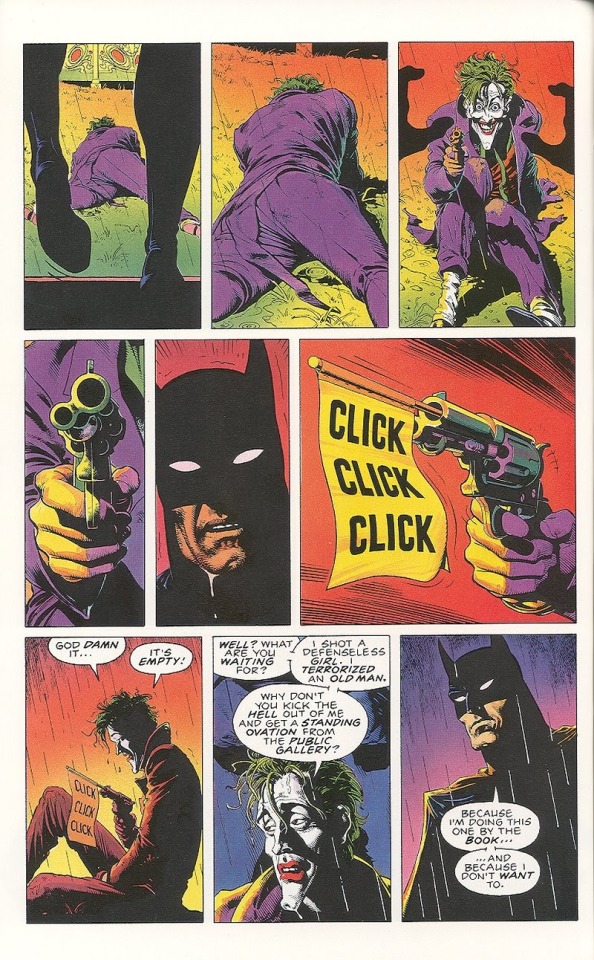
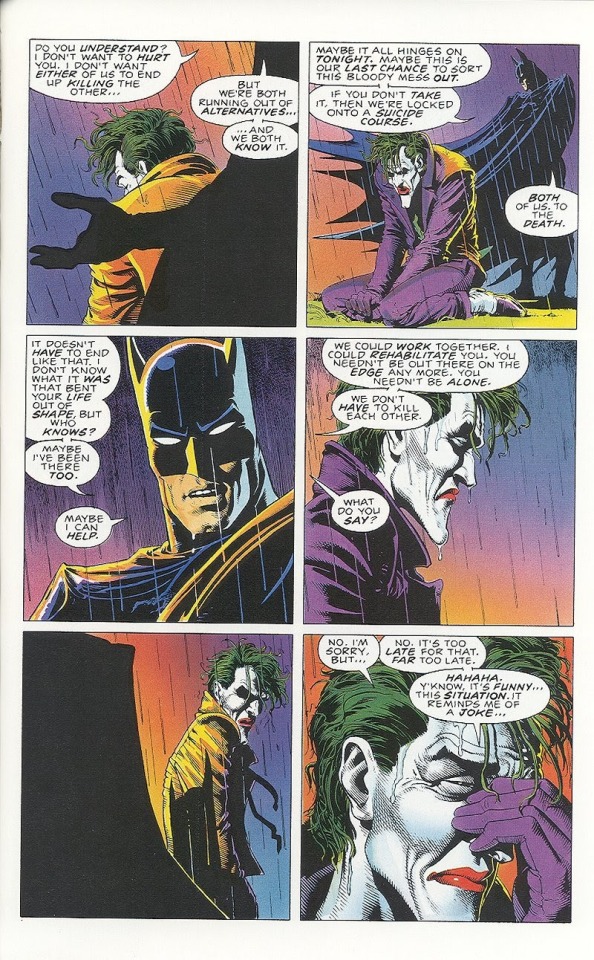
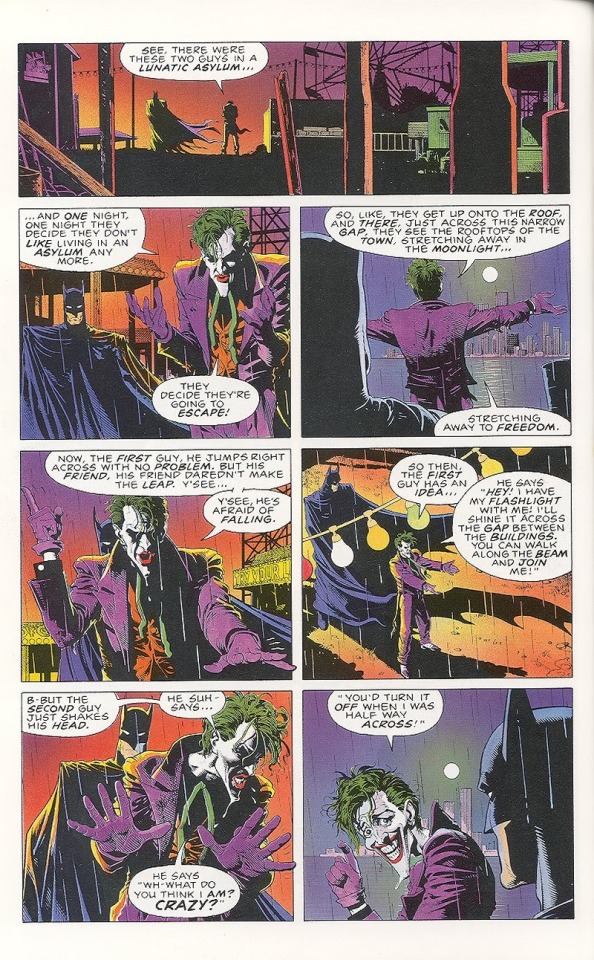
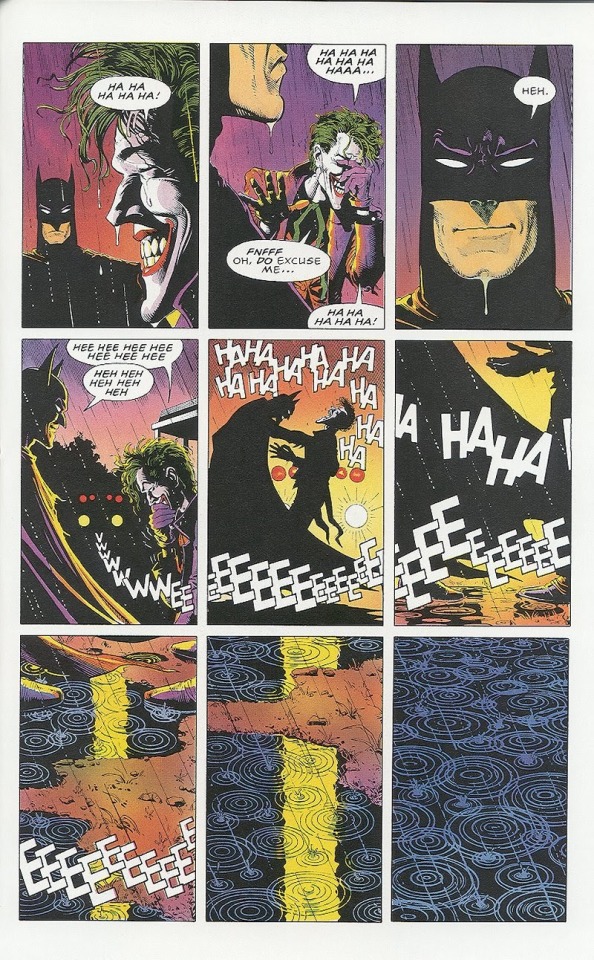
Ah, the infamous cutaway that leaves the ending so open to interpretation. But what exactly does all of this mean? Well, I'll give my interpretation:
The scene starts in the same way as many other fights between Batman and Joker have concluded. Joker gets defeated, Batman saves the day, the clown prince of crime will get chucked back into Arkham until he inevitably breaks out once again, and then they'll do the whole thing over. "You know, I think you and I are destined to do this forever", that's how their story always goes. However, this time things are different.
This time, Batman doesn't beat Joker senseless, even though cosnidering what Joker spent that evening doing to his friends and family, he would richly deserve a good beating by anyone's estimation. Joker expects that of Batman as well, and he accepts the beating and re-imprisonment that he's sure is coming his way, because that's how it's always been. And yet instead, this time Batman chooses to talk with him. He tells Joker the facts of the situation, that despite everything, he actually doesn't WANT to hurt him, and knows that if they keep going down their current path, one of them will eventually kill the other. Batman knows it, and he knows that Joker knows it too, and he doesn't want that to be the case, because above everything else Batman values preserving human life as a goal equal to and often greater than stopping crime. He doesn't want to kill Joker, it would go against everything he stands for, but he knows with every encounter they share that possibiltiy grows more and more likely.
In a similar fashion, the Joker doesn't actually want to kill Batman either. Despite how he may play the part of wanting otherwise, the entire story of the comic up until this point has been about Joker trying to prove a point to Batman. That deep down, everyone can become him, that all it takes is one bad day to turn even the most moral man alive into the Joker. whether this is because Joker genuinely believes this, or it is meant to simply justify and excuse who he himself became from his own tragedy, is never really confirmed, though it is most likely a bit of both.
Either way, we see that Joker is not happy at all by Batman attempting to talk to him instead of beating him. In fact, he's practically sulking. Now, is this due to the fact that his big plan just failed, sure, at least partly. However, there is something else going on as well. All of Joker's plans fail sooner or later, this is no exception. It's something he expects despite coming up with a new one every week. This time though, he genuinely looks depressed, and this is in part due to Batman breaking the magic of their routine. By speaking to him like anyone else, by reaching out to Joker, Batman is attempting to fundamentally change their relationship forever. Batman wants it to end, he doesn't want to keep fighting Joker until it kills one of them, he wants Joker to stop. But Joker doesn't want to stop, he doesn't want Batman to die or stop chasing him because the relationship he has with Batman is all he has left. He has no real friends, no goals outside of plans to mess with Batman more, he has nothing outside of his role as Batman's arch enemy, and he knows it.
And yet, despite all that, when Batman genuinely reaches out to him, appeals to the fact that their lives were both heavily affected by past tragedies and offers Joker help to try and move past that, to be better, even after all the atrocities he's committed, despite all that... Joker actually seems to consider his offer. We can see this by his hesitation, and the fact that he doesn't just laugh it off right away or make fun of Batman as he would any other time.
This time, Joker seems to consider the offer, and turns dead serious in a moment that is probably the most normal display of genuine human emotion we get from him, and he tells Batman that he's sorry. Joker genuinely apologizes for not being able to take Batman up on his offer, looking like he's about to cry as he declares that it's far too late for him to take any offer Batman could give him.
The question is, why? Why is this time so different, why does Joker seem to actually consider Batman's offer and reject it in such a human manner? Well, I truly believe the answer is clearly seen in the joke that the conversation with Batman reminds him of. I will go through it line by line and give my interpretation.
"See, there were these two guys locked in a lunatic asylum" I think this obviously is referring to Batman and Joker. They are the characters of this joke/story, the conversation between them reminded Joker of this joke (or he just came up with it on the spot to suit their situation, but regardless) and they are also the only two characters in the panel where that line is said. In this case, the 'asylum' in question would be their rivalry, their roles as Batman and Joker and everything that comes along with that. Makes sense, none of the things either of them do in those roles are things that normal, sane people do, and both of them were traumatized in their lives by horrible events and spiraled into becoming the Batman and Joker because of it.
"And one night, one night they decide they don't like living in an asylum anymore, they decide they're going to escape." This is a clear metaphor for ending their roles as Batman and Joker, perhaps just for that particular rivalry or all together. Escaping the asylum means returning to the normal, happy lives they had before their trauma. Batman has already stated he wants to end his fighting with Joker, however the fact that both men in the story wish to leave the asylum together implies that Joker also secretly wants that too, which is very interesting as we go on.
"So like, they get up onto the roof, and there, just across this narrow gap, they see the rooftops of the town, stretching away in the moonlight, stretching to freedom." Given that Joker is looking at the moon shining over Gotham as he says this, I think it's clear that the 'freedom' here is living a normal human life the same way all the civilians of Gotham try to every day. It's about having a chance to be better, to do better and make something of your life everyday beyond the endless cycle that he and Batman are trapped in with each other. As long as that cycle exists, they can never truly be free, even though the Joker can break out of Arkham whenever he wants and do practically whatever he wants until Batman stops him. Their rivalry prevents either of them from ever being free.
"Now the first guy, he jumps right across with no problem. But his friend, his friend daredn't make the leap. Y'see, y'see he's afraid of falling." This is where we see Joker differentiate himself and Batman in the story, and how their situations in life currently exist. Batman is the first guy who is able to escape the asylum and return to the city fairly easily, whenever he desires. This is because that, unlike Joker, Batman has his life as Bruce Wayne to live and fall back onto. He has many friends and a large family both adopted and biological who rely on him and give him something good and happy to live for. He can leave the asylum because he sees the light on the other side, he has hope and knowledge that things will turn out alright if he does. But Joker does not. Joker doesn't have another life to live, no family and no friends to fall back on and lift him up. All his life consists of is the asylum and Batman, the other man right along with him. He knows nothing else, and so it seems impossible for him to ever jump across to the other side and join Batman in freedom.
However, it goes beyond that. Joker isn't scared to leave the asylum because it's all he knows, in fact he's just as eager to leave it with Batman. What he is afraid of though, is FALLING as he jumps across. What does falling mean in this case? Well since escaping the asylum would mean ditching the roles of Batman and Joker and returning to a normal life, falling would be failing to do just that, failing so hard that it sends him plummeting right back down, either to death or to being left alone and away from the safety of the asylum and more importantly the companionship of Batman. if he falls but Batman doesn't, he'll be left lost and alone, pointless and forgotten, and that's what Joker fears by leaving the asylum.
"So then the first guy has an idea. He says 'Hey! I have my flashlight with me! I'll shine it across the gap between the buildings. You can walk across the beam and join me!" This part of the metaphor I believe is meant to represent Batman's offer of help to the Joker, the therapy/rehabilitation that's intended to help him get better. In this case though, the help is being represented by something that has little actual effect. You can't walk across a beam of light to cross over to another building, in the joke it's only meant to stop the second guy's fear of falling. It isn't actually a real bridge to freedom, just an illusion of one that Joker thinks Batman is giving him.
However, than we get to the punchline.
"B-but the second guy shakes his head. He suh-says, he says, 'wh-what do you think I am? Crazy? You'd turn it off when I was halfway across!"
And here we get the real reason why Joker can't take Batman's offer, why he can't join him in freedom outside of the asylum. It isn't because he doesn't think the help Batman is offering him would work. The beam of light not being a real bridge to walk across isn't the problem in his eyes. The problem, is that believes that if he tried to walk across it, Batman would shut it off and let him fall. Because what Joker is truly scared of, isn't that the help Batman's offering him wouldn't work, he's scared that the help might actually have a chance at working, that he may have a way to get out of the asylum for good, but that Batman will give up on him before he reaches the other side.
He's afraid that the only person in the world who genuinely cares about him and wants to help him, will end up giving up on him and forgetting him if he tries to get better. We can see that in the way Joker delivers the punchline, turned around to stare directly into Batman's face with a disturbed, crushing smile of realization on his face while the symbol of freedom that is Gotham, bathed in the light of the moon sits directly behind him, just out of reach. He's accusing/telling Batman of why he's afraid, that he could never trust him enough to actually try and rehabilitate him, and he's laughing because he knows there's no way out of this.
And Batman, once the joke finally hits him, realizes the exact same thing. He knows then that Joker will never actually be able to be helped, there is nothing he can do for him because Joker will never trust him enough to let himself be helped. There is no way out of this for them now that Batman's final appeal to peace has been turned down by a man to broken to realize it was his way to a better life, a free life.
And so, knowing now how their story will end, Batman does the one thing that Joker always wanted from him, and breaks his role as Batman for just a moment. He shares in a final laugh with Joker as he puts his hands on his shoulders, up by Joker's neck, and the two laugh and laugh together until the scene cuts away and their laughter cuts off equally as quick.
Now, did Batman kill Joker here? The single question everyone tends to ask when they read this scene. Now, canonically we know that, no, Batman does not kill him, Joker returns again and again after this, but in this case I do fully believe that the creator of this comic, Alan Moore (the same man who wrote Watchmen), did likely intend for that to be the ending. The fact that the scene opens with Batman acknowledging that their relationship will end in death, and that the only way out of that is for Joker to accept his proposal I think seals the intent of the ending pretty well. Joker Can't accept his proposal, because the trust between them that would be necessary for that is something that could never truly be built up as they exist in their roles as Batman and Joker. They both know this, and so Batman ends their relationship and breaks his one rule by freeing Joker the only way left it is possible to free him, in death.
So, as much as I personally think that having Batman kill at all is a fundamental no no that you just can't do with his character because it goes against everything he stands for, I think this as an intended ending by Alan Moore to the relationship of Batman and Joker works very well. It is one of many endings in across many comics. Is it my favourite? No, though I would put it in my top three. however, I do think that this is the meaning that Moore was trying to convey in this scene, and I truly believe he does a beautiful job at conveying it!
#dc comics#my analysis#batman#dc joker#the killing joke#bruce wayne#dc meta#batman meta#dc#dc universe#dcu
53 notes
·
View notes
Text
Clover's personality (in-depth)
This thing turned out way longer than intended. As promised, I wrote my opinions in regards to Clover's mbti; I also wanted to include the enneagram but figured it would be too much, so I'll do that separaretly. For those who wanna get straight to the point, just scroll to the end of the post for a pic of the functions I think Clover has. But if you want more details, read the whole thing. Probably not many people will wanna do that, but I had fun, lol. Please excuse me for nerding out
Analysis
Even before they got into the Underground, Clover thought to themselves "Ok, this is a dangerous mountain and I ain't coming back, I'm probably gonna die and therefore not live to see the rest of my life play out BUT I'm gonna follow my values anyway. They're worth the risk." To me, right off the bat, that's Fi over Ti (aka inner values and morals over inner facts and logic).
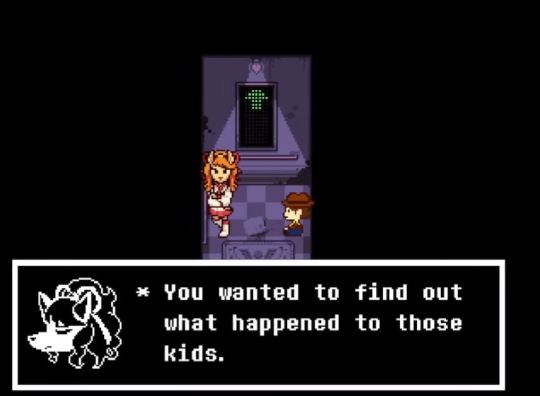
I've done some research on this stuff and found out how "Fi knows the value of something not by analyzing it but by feeling it deep inside themselves that it is how it should be" Ti has to be as objective as possible, Fi doesn't. So I sat down and thought about how exactly Clover approached situations.
I feel like their main reasoning for being in the Underground were their inner values and beliefs of finding out what happened to the children. That's why I'd say they're an introvert rather than an extrovert (it's not because they're quiet and reserved, although they are, but because Clover's inner world affects their outer world). Now, both Ti and Fi look inward, and those inner thoughts and feelings affect how they interact with the external world. The real question is: is Clover objective enough to be considered a dominant Ti user?
We can see in the Vengeance route that Clover is stubborn with their beliefs and refuses to look at things from a more... logical POV: "Asgore killed five humans. Is it fair to wipe out every other monster in my way who gives me even the slightest reason to do it?" Martlet was the only exception because she was the only one who had tried to be nice and understanding. Clover's dark side is that they're tunnel-visioned and see morality as black and white (don't look deeper as to WHY the monsters do what they do), and blindly follow their own beliefs over what objectively makes sense. Just like Ceroba, who I'm positive is a feeler (she only considers how she felt about Chujin and not how skilled of an engineer he actually was, even when there's clear proof he wasn't the best at his job).
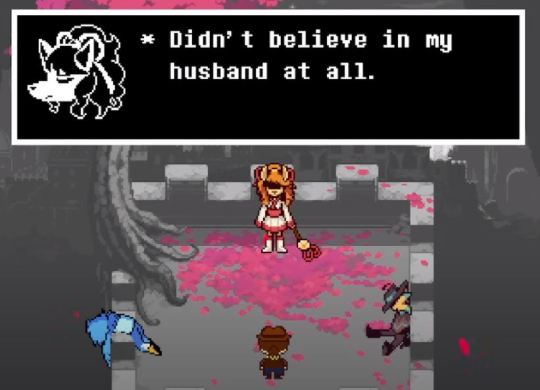
Objectively, it's not fair to kill so many monsters after only five humans were killed. If Clover wanted fair vengeance, they would have stopped after five monsters were killed. But no. According to Clover's own logic, everyone morally imperfect, everyone who's hurt them, who tried to hurt them, or messed up somehow, must die. So, Clover isn't thinking about what makes sense; they're thinking about what makes sense to THEM, and stubbornly hold onto that till the end (again, like Ceroba), even after Martlet's warnings. She says how the Royal Guard will be after them.
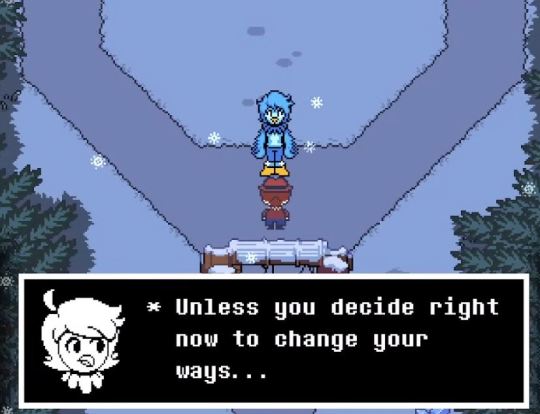
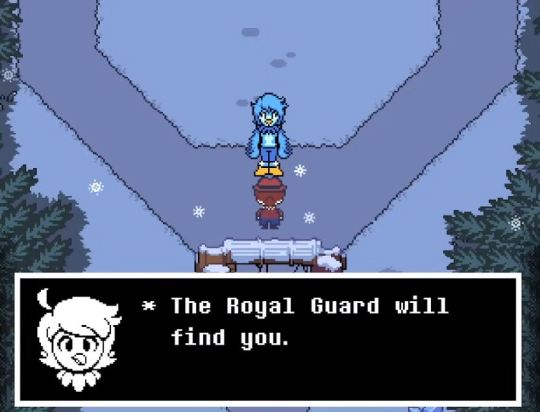
The logical (T) thing to do would be to STOP before things become even messier, but once again, no. Clover doesn't care about the consequences, only fulfilling their mission that is driven by their own set of values. No matter which route you choose, you will be presented with Clover's own version of what "justice" means. It's not the objective truth, it's not what's the logical thing to do; they follow their own framework based on their (our) choices.
"If unhealthy INFPs are dealing with threatened values or viewpoints that oppose their own, they can go the other way and imagine that others are all corrupt, thinking badly of them, and deluded. They may see themselves as the only people who see “the truth”, or the only people who really care to make a difference in the world. They can become especially harsh and critical of others and take on a martyr role, gradually secluding themselves from other people". - this feels like geno Clover; they thought they were the hero but they were playing the villain all along
Now that I think about it, the logical thing to do, the one that makes the most sense, would be never to have entered Mt. Ebott in the first place. And if vengeance was what Clover wanted to do, it is fair and makes objective sense to kill only five monsters (since that's how many humans died). But as explained, Clover didn't follow that logical conclusion, but rather their own twisted sense of justice. The same goes for neutral. It's Clover who chooses who gets to live and who gets to die based on their own beliefs and feelings, which are not backed up by facts. Everything they do they do because they themselves feel like it should be done. They are the one who decide who gets to live and who doesn't based on their own opinion/how severe they think the misdeed of the final boss is. This counts for the regular monsters who attack them, too; again, THEIR own subjective decision.
For example, they might see Dalv's actions as acceptable/forgiveable and spare him, but not Starlo's and kill him. Objectively, both characters are messy in their own way, but Clover gets to be the "judge" and decide their fate, not objectively looking at the situation, but subjectively. In short, according to them, Dalv may deserve to live, but not Starlo.
And even if they're a dominant Ti user, which I don't think they are, Clover is more past and future-oriented than present-oriented (N over S). As mentioned, they thought about how much they'd risk by going down Mt. Ebott (potentially dying, and definitely never seeing the surface ever again, or their family) but they followed their heart's desires; to them, morals and ethics (their own morals and ethics) were more important than what the more logical thing to do was (stay on the surface where it's safe).



In other words, they could already "predict" what would happen in the future, while in the present moment (the beginning of the journey).
And right before sacrificing their soul in pacifist, they think about how their death would affect ALL the monsters in the future, whether they had directly met and befriended them or not, even though they wouldn't be there to see it.
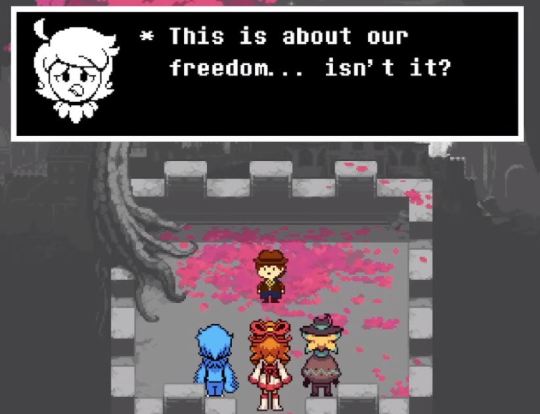
Clover seems to be able to easily move between the past, present and future, unlike sensors, who are mainly in the present moment (this is what I've heard somewhere at some point and remembered it, dunno how true it is). They can easily recall the past, and what they remember are things that moved them on the inside.
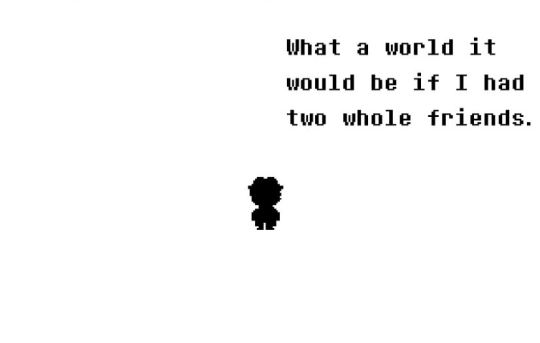
I've heard some of my friends say that Clover's character arc was to become a kinder person (develop their Fe), which, honestly, I don't think is the case. They simply acted on their inner views of what justice truly means, without further analyzing whatever they believed justice to be.
In pacifist, they're naturally selfless and kind and forgiving: a bit of a prankster, but they're one of "the best souls" according to Martlet. Just look at the ACT options that they used to befriend monsters. Quietly listens to Decibat, offers Dalv a handshake (and friendship), easily forgives Martlet, Starlo, and even Ceroba (+ gives her a hug), endures so many hardships yet keeps their heart pure and selfless.
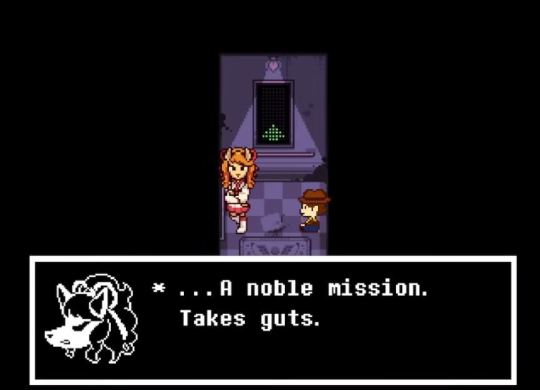
They were always driven by something bigger than themselves (like Chujin, who I also think is a N user).
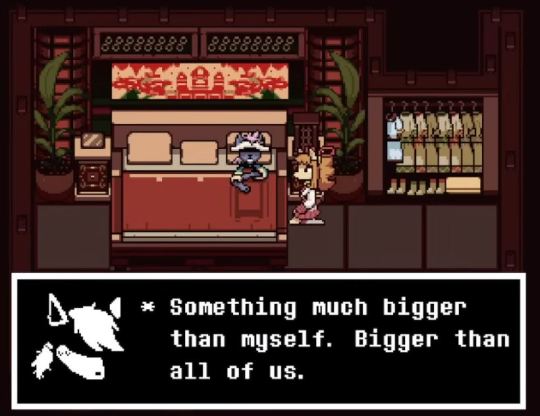
ISTPs are more adventurous and independent and flexible and focused on current problems in the present moment; Clover has been future-oriented from the start; they depended on Toriel to take care of them, and didn't try to immediately "adapt" to the monster world. Their 1st reaction was to stay safe and cozy. ESTJs (yeah, at some point I thought Clover could be one) are more "ruthless" in their pursuits, they "force" others to adopt their inner values. Clover doesn't do this in any route; they simply act upon their own beliefs, but aren't demanding that other monsters to have those same beliefs.
That's why I think they're an INFP.
Functions
Fi (dominant) – "If something goes against their moral code, they will not go through with it." It went against Clover’s moral code to spare monsters in genocide and abort the mission, so they didn’t, regardless of Martlet’s warnings.
"Fi dominants are inclined to speak up against beliefs or actions that go against their personal values or express disapproval of certain behaviors." I can't find the screenshot, but in the Mines, if you interact with the character who's in the same room as one of the puzzles, Clover will find out how that character pulled a prank on that guy who later got a promotion in the pacifist end credits (I need to reply the game to find the screenshot). But basically Clover was upset that their own morals weren't met and gave them a "disapproving look" or smth
"Ti dominants most often feel compelled to speak out when people are acting inconsistent (ie: contradicting themselves) or when people are being illogical from the Ti user’s perspective." I think Clover reacted to the above situation as a Fi user
"Unlike Fe users, Fi users are very blunt and direct. Fi and Te creates a person who is brutally honest about their opinions and feelings. If they don’t like a person, they will let that person know." Not a person in this case, but an example of this are the options we get for Martlet's questionnaire. Clover will have no problem honestly giving her the lowest scores for both questions; we also also get the chance to honestly tell Ceroba that we're not into Starlo's training. There are these cases where they're direct as well:
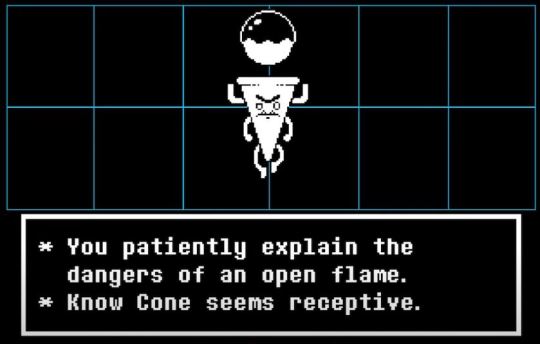
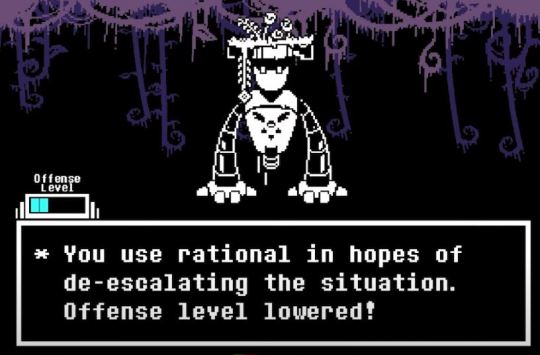
...and blunt:
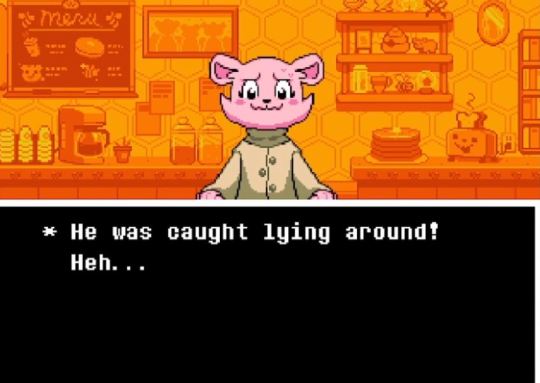
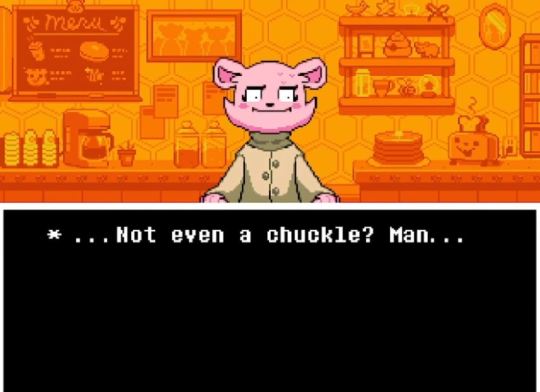
they would have given at least a smile or a thumbs up, but no, their honest opinion is their honest opinion
"They appear cold and withdrawn, but tend to warm up as they get to know a person."
Ne (auxiliary) – "Ne views a situation from multiple angles and motivations" I feel like this is best seen in pacifist; this is exactly why Clover decided to give up their soul in the end; they saw all the motivations of the monsters, from many different angles. On the flip side, in the vengeance route, it’s the complete opposite situation: Clover only looks at things from their own pov, completely disregarding others. That’s the thing about the INFP dark side: INFPs become "disillusioned or stuck in their ways." This 100% describes Clover at their worst: stuck in their ways is already explained, while we can say they were disillusioned when even Martlet turned against them/gave up on them (in Genocide). That was enough of a reason for Clover not to feel bad about finishing her off. They never liked her, but they definitely liked her more than anyone else, so I’d say it counts.
"Creative, open-minded, and able to think outside the box" We can say Clover’s creative when they build Axis’ robot companion, solved the two puzzles in the Mines, they’re also most likely into role-playing just like Starlo, based on their clothes (and they seemed into the whole larping thing with him), and how they seem to be into drawing; open-minded, definitely (Clover with everyone; the pacifist route in a nutshell); able to think outside the box (this goes hand in hand with them being creative: I forgot to mention the many creative ways they found to befriend monsters)
"Ne lives in the present like Se does but makes connections to past and future." Imo, this is exactly what Clover does (their sacrifice in the future, and all the things other monsters had said to them in the past; however, they DO interact with the present world at the same time. This is what I meant when I mentioned how they "jump from and connect all 3")
Si (tertiary) – "happy in their comfort zone" Is this Clover? Yeah. Initially, this was their "default" reaction/behavior: with Toriel. They subconsciously became more independent thanks to good old Flowey. As I said, their values led them to take the risk and come into the Underground in the first place, not adventure/excitement (the way I see it). Were they also seeking the truth? Yeah again, they wanted to know the truth behind the whole situation, but I think it had more to do with how they had found the fact that no other humans bothered to look for the kids immoral.
"Si users may draw on their past experiences to guide their present actions and decisions" Example, how the detailed lines they remembered everyone said in true pacifist, influenced them to make the decision to die in the present moment. Or when they asked Ceroba if she would date Starlo, after hearing and remembering Crestina mention his crush on her beforehand, wanting to set them up.
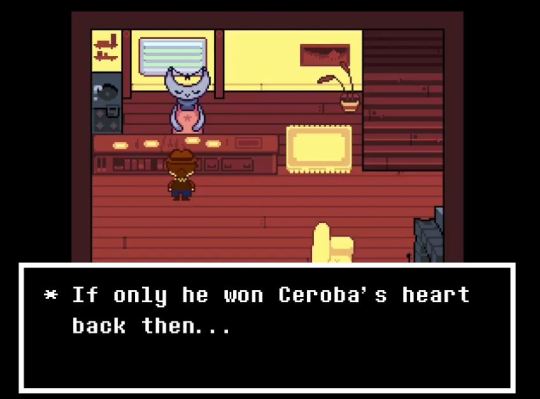
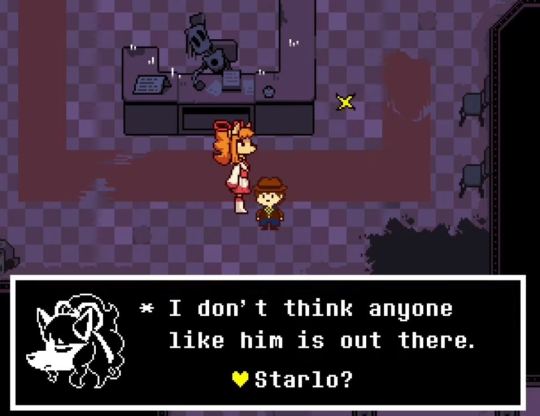
"Si users have a strong memory for past experiences and details" Yep, explained above. Also, dunno if this counts as noticing details, but we can make them beat the Shufflers’ game with ease.
"Si users are typically practical and realistic in their approach to solving problems" The Snowdin mini-quests come to mind (although they use past information here too to figure out what each character needs to be helped). Also, how they fixed the elevator by using a pickaxe (most practical & realistic choice). They’re also pretty rational while dealing with Guardener, and in general, while dealing with enemies.
Te (inferior) – I guess this is why I suspected they could be an ESTJ.
"seen as leaders" By everyone.
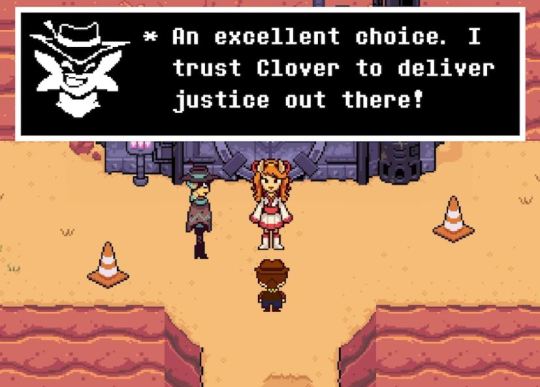
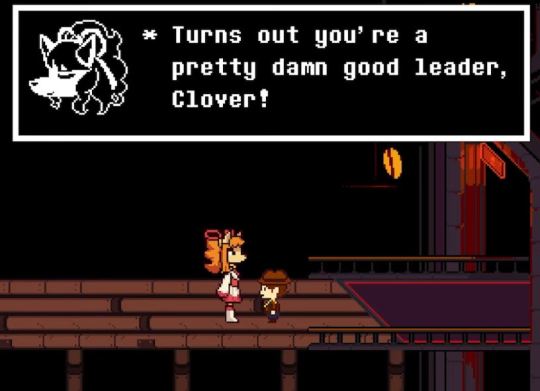
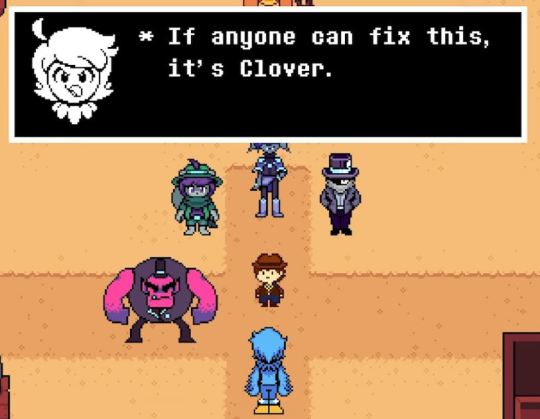
"Come up with ideas quickly" Pretty much throughout the game. They’re more low-key about this than ESTJs though.
"Ruthlss and domineering" This is them in vengeance route
"Extraverted Thinkers recognize the emotional content, but then they set it aside to focus on the facts" I feel like this inferior function of theirs is mostly seen in flawed pacifist. They recognized Ceroba’s emotional situation, but chose to be fair and just instead.
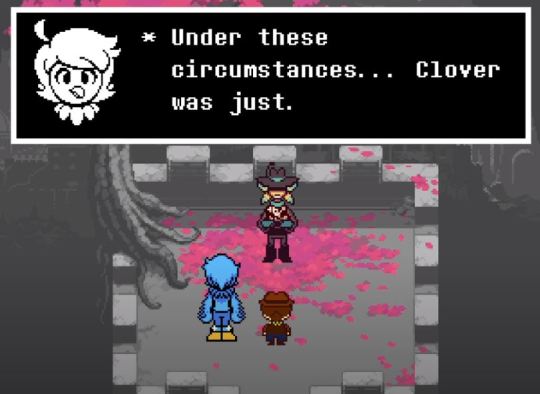
"Te users are logical" Recognizing the dangers of the Underground and deciding to stay with Toriel. We can also say it makes sense that Clover attacked those who attacked them first, and finished Ceroba off (Te is what is objective, but from the external world)
"Though they are generally free spirits, they like to have a certain order in their lives. They do enjoy structure, just as long as it does not intrude with their feelings/morals/ethics/etc. They like to be the ones to create the structure, not to have the structure to be created for them." Vengeance route and Clover’s "mission" come to mind. Basically, the structure is that, whoever Clover sees as morally flawed, gets to die. And they stick to it
tl;dr this picture pretty much explains the way I see Clover's functions in a nutshell ↓
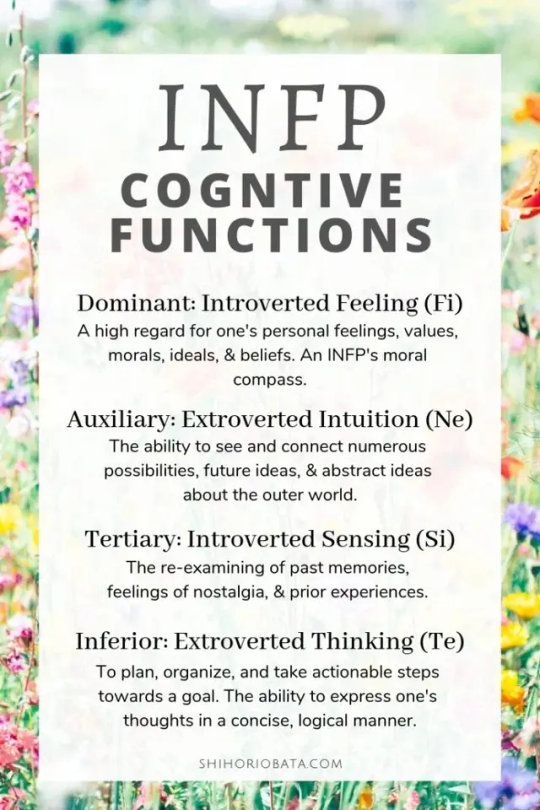
#another reason i think this type fits clover is bc it is my type too#and i relate to the kid sm#uty#undertale yellow#clover uty#uty clover#clover undertale yellow#undertale yellow clover#clover#character analysis#some part of me still finds it tough to differentiate ti and fi#but that future oriented personality was what steered me towards fi more#clover deff has a certain set of values and that was why they were kind to absolutely everyone in their way#in pacifist#they are such a moral kid#they value truth too but to a lesser extent than morals imo#uty spoilers#ceroba also called them naive#which makes me think Clover didn't have a logical plan#just wanted to right this wrong#and in geno martlet says smth like “you wanted to see the best in those kids”#again Clover doesn't know what they were like but chooses to believe they were good#innately kind that's who Clover is#but in geno they didn't broaden their horizons#long post
40 notes
·
View notes
Text
Today is (for many of us) the feast of Christ the King, and I wanted to take a moment to honor that. I was baptized on this feast, and I've always been drawn to it. Originally instituted by the pope in 1925 as a response to growing nationalism and secularism, making it the newest element of the liturgical year, most Lutherans and other liturgical Protestants also honor this day.
I have differing opinions on secular rule/the separation of church and state (and evangelism, for that matter) than the founders of this feast did, but I can appreciate the yearning for more world leaders/political groups/religious groups to recognize our true callings as human beings--to each other, to Love. And I love the concept of combating nationalism with allegiance to a higher power!
"King" has a lot of political implications, and mostly negative associations for anyone like me, so I wanted to point out how the original encyclical describes this title of Jesus's, by quoting Cyril of Alexandria: "Christ," he says, "has dominion over all creatures, a dominion not seized by violence nor usurped, but his by essence and by nature." Today is the reason I'm not a monarchist--there is no earthly ruler that has my allegiance. There is no earthly rule established without force. My allegiance is to Christ, the ruler of the only valid kingdom; to God's house, the only state without lines on a map; to Love which is the universe, the only empire that includes people by embracing them rather than conquering them.
We can only understand so much of who God is. We separate out God's roles; we can only focus on one tiny piece of the universe at once. (This is why we have holidays--to honor pieces of our religion in human time.) The king we are called to serve is only called "king" because that's one of the closest words we have in our language to describe what we're talking about--the old-fashioned meaning of king, one born for the role and called to die for the role. A romanticized meaning perhaps, one that has never been true in any society, one that has caused so much harm, but nonetheless one used throughout centuries to get across one of the ways we approach God--along with "father" and "friend" and "bridegroom" and "creator."
We pray for God's kingdom to come because that's an idea we can understand--we can logically process that a new kingdom coming, a new empire conquering, means everything changes, the rules are turned upside down. We hold this language while acknowledging there is so much more to it. If you can't stomach using these words, if they are filled with violence for you, I encourage you to sit with that truth, consider what it would be like to take earthly ideas and fill them with Love, and also acknowledge you do not have to use this language. We try to hold God with our words and fail over and over. We come to God from our culture and language and time and we squint at the universe. We see in a mirror dimly, for now.
As we encounter earthly nationalism and imperialism and colonialism and warmongering, as we see people claim that their nation-state is chosen by God, we honor power turning on its head today. We see Jesus revealing what kingship, what ruling, what power is when Love is the center of the universe. Jesus, who had more power than any human, fed the hungry, hung out with the oppressed and misunderstood, threatened the powerful without violence, was killed by earthly empire, and conquered death with life.
May we, as members of God's kingdom, under Jesus's rule--by choosing this as our practice--serve the only king who has ever deserved our allegiance. We work to bring our communities and religious groups and, yes, our nation-states, closer to the image God has set for us, but ultimately we know we are creating and navigating human-made borders between things that will one day be one.
You already know what God has asked of you. It's not a democracy but neither is it a monarchy, really--it's something else. Something you have to opt in to, but don't really get a choice in. Something you can run from but never escape. Something that once you see clearly, you'll never be satisfied without. You are technically free to abandon the work, but you would be abandoning the only thing that will make us whole. Call your government representative. Go to a protest. Give money to the person by the side of the road. Read a book. Hug your lover. Feed the birds. Denounce your country in favor of your community and every single human being. You are a citizen of the universe, which is God, which is love. Christ the King, the reign of Christ, means what rules us is Life.
(We look down the road to Advent--to new year, rebirth, apocalypse. "Apocalypse" meaning unveiling, revelation, disclosure. We see in a mirror dimly, and then--thy kingdom come--we see face to face. All at once, awfully, blindingly, daylight after years of darkness. Christ the King says, what if New Year's Eve was a surrender to time and power? What if before you even remembered Christmas exists, you were confronted with the reality of your calling? This is the feast of victory to our God. Alleluia!)
99 notes
·
View notes
Text
Let's talk about the relationship between "personal level redemption (i.e. one character starts making changes for the better)" and "the corrupt institution/context in which the characters are developed to hurt each other".
Now, one or two characters reaching the point where they say "that's it, no more, I don't want this, this is not right, I am choosing not to continue on this path" is great, don't get me wrong. Redemption (AKA the path towards trying to do better, to make reparations, to not repeat the mistakes of before - forgiveness is not an obligation here, only that the character has recognised their hurtful actions and has ceased them and is now trying to do better) on a personal level is so important, and should not be diminished in value.
However, it is also simply and factually true that when it comes to the context in which certain characters have made those terrible choices or been forced to become something they otherwise might never have become, that in order for there to be actual long term solutions, those corrupt systems, those violent institutions - those must be dismantled. These things must stop in order for the system to not just keep on chugging, to not just break the next set of characters as it broke the last ones.
Sometimes, a character cannot realistically meaningfully travel very far down their path to redemption before something changes or shifts within that system in order to allow them that. For example, a character who is constantly on the defensive because people are hunting them down to try to kill them doesn't have the option of not defending themselves (usually with violence) unless they choose to die at their hunters' hands. Even if they do not start fights, they can't disengage if others start them first; in order to stop, others must also stop.
It is unfair, in contexts where there is a great and systematic corruption, to place the onus of a "happy ending" on singular people if there is no intention of dismantling the system that gave birth to such horrors. How cruel, how unjust, to take one person and say to them, "this is all, totally and completely, your fault, and it is your responsibility to change because you are the thing that needs fixing here."
Think of it like climate change: yeah, sure, putting your rubbish into the correct bins and reducing your personal carbon footprint etc is helpful. But what change you can make, if you make it alone, if you make it isolated, will never meaningfully chip away at the global level of pollution caused by the whole system. What needs to happen is a lot of people banding together to force the system to change, and for those who benefit from it to be held accountable. Because that's the other element of tragedy: there is nearly always someone benefitting from the tragedy, and it is not often those who are the most blamed or slandered.
Yourself may be a good place to start, but it is not where it ends. It is a long hard road, to the recognition that there are many factors that contribute towards tragedy - to the personal choices of characters, and to the reasons they made those choices in the first place; the action = reaction, the consequences, the pressures, the emotional and mental factors, the physical factors, the numerous interweaving stories of everyone trying to protect them and theirs, and sometimes in doing so hurting others.
Redemption and understanding how tragedy came to be is rarely as simple as we want it to be, and this complexity is a feature, not a bug. If you want to be able to point at someone and say "there; that is the bad thing" then 99/100 times I would first take a good look around to see what made the bad thing bad. Then I would take one good look at yourself in the mirror, and ask yourself if you could have been the bad thing, too, if things had shaken out just that little bit differently - the answer might not be one that comforts you.
#airrec talks#this is 100% about BOTH c!dream AND c!tommy btw#it takes two to fucking tango and both of them are victims of a greater culture of violence that hung them both out to dry#this is also why the amnesia ending happened tbh. it all just had to get wiped clean and on a meta level#resetting the world and everyone's memories was a shortcut way to doing that. also the ccs were so burnt out by the end lbr
51 notes
·
View notes
Note
Hello, Im not really good at putting my thoughts into words and english isnt my first language, so im sorry if this doesnt make sence.
Cw talking about suicide
If killer and color got their happy ending and got to escape nightmare, I think killer would kill himself eventualy, specificaly i think it would be stage 1
As far as i understand wasnt it implied that killer was going to kill himself but then nightmare took him out of his au to work for him. And i dont think stage 1, in the rare ocurances that he was "awake" (idk how to say this properly ×_×) he wouldnt like being forced to kill again but now under someone elses command so maybe he will try to end himself too, but nightmare would propably cause a forcable switch to his soul so he would go back to stage 2.
Color let killer choose to go with him, so surely color wont entervine when killer decides to not exist anymore? Well i guess if killer chose to leave with color than maybe he decided that he wants to live, since working for nightmare, he would be dead anyway, either from nightmare or maybe form some other person while hes in a fight or somethingm
But as someone who relates to killer a lot.. i dont think this urges of wanting to die would go away that easily. Im sure stage 1 still thinks about it, and maybe he would feel guilty for troubling color with his problems , that he doesnt deserve to have color as a friend and hes only causing him trouble and such. Stage 1 would propably feel bad for killing people and causing pain to so many people maybe.. Im just thinking about how color crying having to let his friend go on his last walk, and killer comforting him, that this is truly what he always wanted...
If color was truly his friend he wouldnt take the freedom away from him and try to convince him not to do it right? Wouldnt killer think that color is taking that choice away from him. Or maybe it would be different with color, i dont know...
I dont know how to conclude this, I hope this makes sence... i love reading your theories and headcanons for killer and color, you made me care about him again after years of not being in the fandom^_^ i hope you have a good day
I get what you mean. And I agree that even in his Good Ending, killer will struggle in many ways. his self destructive tendencies and suicidal ideation and self harming behaviors wont just dissipate. And neither would the absolute shame in his existence, the belief he doesn’t deserve to exist.
I do believe that if color realizes that killer is dead set on killing himself, that existing just hurts him more, although it will be hard and color would exhaust every option first..I don’t believe color would ever take away killers choice. especially not when this is a choice thats been taken from him before.
..maybe they’d even attempt to do a double suicide or a suicide pact. but I think killer would want color to live, if only to keep him alive in his memory a little longer before they met again in the afterlife.
but heres the thing. killer & colors stories are one of the very few in the utmv that ends happily, on a hopeful note. And I don’t wanna take it from them when it’s something they fought so hard for.
and..well, the idea that tortured people can only find happiness and peace in death and will never ever heal..just upsets me a lot. i think killer deserves to live life, however long he has, with those who he loves and who love him back. and i want him to pass smiling and content.
he may not live to be anything close to physically elderly, but I want to believe he cherished the last few years of his life. and he was happy.
#howlsasks#cw sui mention#cw self destruction#utmv#sans au#sans aus#killer sans#killer!sans#killertale#color spectrum duo#killertale sans#something new#undertale something new#undertalesomethingnew#something new sans#something new au#color sans#colour sans#color!sans#othertale#othertale sans#undertale au#undertale aus#i need them to have their happy if difficult ending#yeah sure sometimes love isnt enough but what if it is in this instance
30 notes
·
View notes
Note
Hello, hope you are having a good day/night
I was wondering if you have any advice for making immortal characters?
I'm making one for a story and kinda stuck on a few things
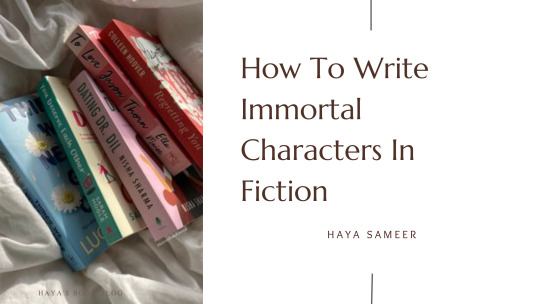
Crafting immortal characters presents a unique set of challenges for writers. Visualizing the personality and lifestyle of someone who has lived for centuries can be a daunting task. I personally haven't written many immortal characters, but here is my simple guide to writing immortal characters.
Understanding Immortality
Immortality is a concept that has captivated storytellers for centuries. Before diving into the intricacies of writing immortal characters, it's crucial to establish a clear understanding of what immortality means in your story's context. Consider whether your characters are ageless, impervious to injury, or possess an endless lifespan. This foundational knowledge will shape how you approach their characterization and the challenges they might face.
The Appeal of Immortality
Deciding whether to make a character immortal is a significant creative choice. Immortality can add depth and intrigue to a character, but it's essential to weigh the storytelling benefits against potential drawbacks. Consider the thematic elements of your narrative—does immortality serve the central themes of your story? If your story explores the passage of time, loss, or the human condition, immortality can be a compelling tool.
Additionally, immortality allows for the exploration of different time periods, historical events, and changing societal norms. It can provide a unique perspective on human existence and create opportunities for character growth over an extended timeline. However, it's crucial to strike a balance, ensuring that immortality enhances the narrative rather than overshadowing it.
Types of Immortality
When delving into the concept of immortality, it's important to explore the various types that can shape the nature of your immortal character. Immortality isn't a one-size-fits-all concept, and different narratives employ diverse approaches to convey this enduring existence. Here are several types of immortality to consider:
Biological Immortality:
Biological immortality refers to a character's ability to cease aging and remain in a perpetual state of physical youth. This form of immortality doesn't prevent death from external factors like injury or disease but ensures the character won't die from old age.
Regenerative Immortality:
Characters with regenerative immortality possess the ability to recover rapidly from injuries, regardless of their severity. This type of immortality allows for survival in situations that would be fatal to others.
Resurrection Immortality:
Resurrection immortality involves characters who can come back to life after death. This form of immortality often comes with certain conditions or limitations, such as a specific time frame for resurrection or the need for an external force.
Cursed Immortality:
Some immortals might be cursed to live forever as a consequence of their actions or a supernatural event. This form of immortality can add complexity to a character's journey, as they grapple with the burden of eternal life.
Spiritual Immortality:
Spiritual immortality separates the character's consciousness from their physical body. Even if their body is destroyed, their consciousness persists, potentially allowing them to inhabit new vessels or even exist as ethereal entities.
Conditional Immortality:
Characters with conditional immortality can only be killed under specific circumstances or by specific means. This form of immortality often adds tension to the narrative, as characters may need to discover and exploit these weaknesses.
Choosing the type of immortality for your character depends on the themes and dynamics you want to explore in your story. Each type brings its own set of challenges and opportunities for character development.
The Challenges of Writing Immortal Protagonists
Crafting an immortal protagonist comes with its own set of challenges, demanding careful consideration to avoid narrative pitfalls. While the allure of an eternal character might be tempting, it's essential to navigate potential obstacles effectively. Here are some challenges you might encounter when writing immortal protagonists:
Stagnation and Boredom:
Immortality could lead to stagnation, with characters becoming disinterested or bored over centuries. Finding meaningful pursuits or addressing existential ennui becomes a crucial aspect of immortal character development.
Loss and Grief:
Immortal characters often witness the passing of loved ones, raising questions about coping with eternal grief. Exploring the emotional toll of enduring relationships and inevitable farewells adds depth to their narrative.
Maintaining Tension:
The fear of death is a powerful narrative tool, and writing an immortal character requires innovative ways to sustain tension. Introducing other forms of vulnerability or consequences for their actions becomes essential to keep the stakes high.
Relatability to Mortals:
Immortal characters might struggle to relate to mortal experiences, making it challenging for readers to empathize. Balancing their extraordinary existence with relatable elements ensures readers can connect with the character on a human level.
Memory Overload:
With centuries of experiences, memory overload is a realistic concern. Immortal characters may grapple with the weight of accumulated memories, potentially leading to mental strain or identity crises.
Moral Evolution:
Immortal characters must undergo moral and emotional evolution over time. Addressing how their perspectives change across centuries and adapting to evolving societal norms adds complexity to their character arc.
Navigating these challenges requires a delicate blend of creativity and empathy. Immortal protagonists offer unique storytelling opportunities, but their narratives demand careful handling to resonate with readers and maintain a compelling plot.
Character Development and Immortality
Creating a dynamic and relatable immortal character hinges on their growth and transformation over time. While immortality offers longevity, it shouldn't equate to static personalities. Consider the following aspects to ensure your immortal protagonist undergoes meaningful character development:
Learning from Experiences:
Immortality grants the opportunity for characters to accumulate diverse experiences. Showcase how these encounters shape their beliefs, values, and perspectives. Immortal characters should evolve emotionally and intellectually, drawing wisdom from their extensive life.
Adapting to Change:
Explore how your immortal character adapts to societal and technological changes. Their ability to navigate evolving landscapes, both physically and metaphorically, provides opportunities for character development and engaging storytelling.
Embracing Vulnerability:
Despite immortality, vulnerability adds depth to characters. Introduce challenges or weaknesses that resonate with readers, fostering empathy and connection. Immortal characters should grapple with their humanity, despite their extended lifespans.
Exploring Relationships:
Immortal characters can form unique connections across different time periods. Delve into the complexities of their relationships with mortals and fellow immortals. Address the impact of enduring friendships, love, and loss on their emotional landscape.
Personal Growth Arcs:
Craft personal growth arcs that transcend centuries. Immortal characters should confront internal conflicts, flaws, and insecurities, showcasing a relatable journey of self-discovery despite their extraordinary lifespan.
Facing Consequences:
Immortality doesn't exempt characters from facing consequences. Establish a sense of accountability for their actions, ensuring that decisions made centuries ago still reverberate in their present. Consequences provide narrative tension and drive character development.
Remember, immortality shouldn't hinder character growth; rather, it should enhance the depth and complexity of their journey. Immortal protagonists can offer readers a compelling exploration of humanity, time, and the enduring quest for self-discovery.
Physical Changes and Lack Thereof
When crafting immortal characters, the portrayal of physical aspects becomes a crucial element. Consider the following factors to effectively convey the unique nature of immortality in your writing:
Ageless Appearance:
Immortal characters often maintain a youthful or ageless appearance, defying the natural aging process. Describe their timeless beauty or the perpetual state of their physical prime, emphasizing the contrast with mortal characters.
Scars and Battle Marks:
Showcase battle scars and marks as enduring symbols of an immortal's longevity. These physical remnants tell stories of epic encounters, providing a visual narrative of the character's journey through time.
Adaptive Evolution:
Explore the idea of adaptive evolution in immortal beings. Depending on your world-building, immortals might possess the ability to adapt physically over time, gaining new attributes or even altering their physical form in response to challenges.
Stasis and Stagnation:
Delve into the potential downsides of immortality, such as the risk of stagnation. Immortal characters might experience periods of stasis, where their physical appearance and abilities plateau, presenting a unique challenge to their personal growth.
Temporal Reflections:
Use reflections, whether in mirrors or bodies of water, to emphasize the temporal disparity between immortals and mortals. Immortal characters may see reflections that carry the weight of centuries, offering poignant moments of self-reflection.
Symbolic Transformations:
Employ symbolic physical transformations to mirror an immortal's internal evolution. For instance, a character's eyes could change color or exhibit unique features during pivotal moments, signaling shifts in their emotional or psychological state.
Effectively portraying physical changes, or the lack thereof, allows readers to immerse themselves in the intricacies of your immortal characters. Balancing the timeless allure with nuanced details enhances the richness of their existence within your narrative.
Psychological Realities of Immortality
Navigating the psychological landscape of immortal characters adds depth and complexity to your storytelling. Consider the following aspects to capture the essence of their enduring minds:
Temporal Perspective:
Immortals view time through a vastly different lens, witnessing the ebb and flow of history. Delve into their temporal perspective, exploring how centuries of existence shape their perception of fleeting mortal lives.
Accumulated Wisdom:
Immortality often comes with accumulated knowledge and wisdom. Showcase the breadth of their insights, portraying them as repositories of experiences and lessons learned throughout the ages.
Isolation and Relationships:
Explore the theme of isolation that can accompany immortality. Immortal characters might struggle with forming lasting connections with mortals due to the inevitable heartbreak of witnessing their transient lives.
Personal Evolution:
Detail the personal evolution of immortal characters over time. Just as their physical forms may change, their personalities and beliefs can undergo profound transformations, allowing readers to witness the intricate interplay of experience and growth.
Existential Questions:
Immortals grapple with existential questions about the meaning of their eternal existence. Address their struggles with purpose and identity, weaving a narrative that reflects the timeless quest for self-discovery.
Emotional Resilience:
Immortals may develop emotional resilience, adapting to loss and upheaval with a perspective that transcends the immediate pain. Explore how they cope with emotional challenges and form coping mechanisms unique to their enduring nature.
Moral Dilemmas:
Immortality often raises moral dilemmas. Consider how an immortal character confronts questions of ethics, morality, and the consequences of actions that reverberate across centuries.
Crafting the psychological realities of immortality invites readers to delve into the intricate minds of your characters. By seamlessly integrating these aspects into your narrative, you create a compelling exploration of the human—or rather, immortal—experience.
Physical Manifestations of Immortality
The physical aspects of immortal characters can significantly shape their presence in your story. Paying attention to these details enhances the believability of their immortal nature:
Ageless Appearance:
Immortals often maintain a perpetual youthful appearance. Describe how they defy the aging process, showcasing flawless skin, unchanged features, and an eternal vibrancy that sets them apart from mortals.
Healing Abilities:
Explore the regenerative capabilities that come with immortality. Immortal characters can heal from injuries that would be fatal to mortals, adding an element of resilience and invincibility to their physicality.
Resilience to Disease:
Immortality typically grants immunity to diseases and ailments. Consider how your characters navigate a world where mortal afflictions hold no power over them, emphasizing the contrast between their enduring health and the vulnerabilities of mortals.
Enhanced Strength and Agility:
Immortals often possess heightened physical abilities. Showcase their extraordinary strength, agility, and reflexes, allowing them to excel in physical feats beyond the capabilities of ordinary humans.
Immortal Scars and Markings:
Delve into the concept of immortal scars—wounds that may linger as reminders of past battles or significant events. These scars, unlike mortal wounds, serve as enduring symbols of an immortal's journey through time.
Adaptation to Environment:
Consider how immortals adapt to various environments and climates. Whether it's extreme temperatures or challenging terrains, their bodies may possess a remarkable ability to endure conditions that would challenge mortal limits.
Shape-Shifting or Transformation:
Some immortals possess the ability to change their physical form. Explore the concept of shape-shifting or transformation, allowing your characters to adopt different appearances throughout their eternal existence.
Inherent Magical Traits:
Immortality is often intertwined with magical elements. Highlight any inherent magical traits your characters may possess, such as the ability to manipulate elements, control forces of nature, or tap into mystical energies.
By intricately weaving these physical manifestations into your narrative, you create a vivid portrayal of immortal characters that captivates readers and adds a layer of enchantment to your storytelling.
I hope this blog on How To Write Immortal Characters will help you in your writing journey. Be sure to comment any tips of your own to help your fellow authors prosper, and follow my blog for new blog updates every Monday and Thursday.
Looking For More Writing Tips And Tricks?
Are you an author looking for writing tips and tricks to better your manuscript? Or do you want to learn about how to get a literary agent, get published and properly market your book? Consider checking out the rest of Haya’s book blog where I post writing and publishing tips for authors every Monday and Thursday! And don’t forget to head over to my TikTok and Instagram profiles @hayatheauthor to learn more about my WIP and writing journey!
#hayatheauthor#haya's book blog#haya sameer#haya blogs#writers on tumblr#writer community#writer tools#writer blog#writer stuff#writer wednesday#writer tips#creative writing#writers of tumblr#writerscommunity#writeblr#writing community#writer spotlight#writer things#writing prompt#writing tools#writing stuff#writing#writing life#writing inspo#writing help#writing advice#writing inspiration#writing ideas#writing things#writing tip
132 notes
·
View notes
Text
Evil Morty's name
...I'm under the impression that the show very much does not want us to call him "Evil" Morty.
1. The name was coined by the fans, not the creators (if this article is to be believed, at least):

2. A different name was handed to us, but it didn't catch on:

3. Evil Morty seems to me to be pushing the idea that being "evil" is something that describes every Morty who rebels against his tormentor...

...which in turn, means it's not defining of him. If a thousand angry Mortys lash out and therefore become "Evil Morty", how does this name differentiate him, specifically? How does it function as a name he'd choose for himself?
We can't really say that only a very small number of Mortys turn against Ricks, either, because he says to Morty Prime: "Now you're Evil Morty too. Sooner or later we all are." If he is to be believed, this means that it happens often. A lot.
...So I think it's a bit like calling Slick Morty "drama implant Morty". There are countless Mortys with a drama implant, but only one who also rolls up his sleeves and is called Slick Morty and who gave his life away in a desperate wish.
4. Rick protests against the name.

5. He seems to be bitter about the name:

6. In the show he claims that being sick of Rick is makes him evil, which can be translated either as:
(a) "I'm so desperate I have no choice but to escape at any cost, even if I have to do cruel things" OR
(b) "you can do any cruel act and it can be overlooked as humorous (couch Morty Prime killing people so he can die old with Jessica cough) but if I do cruel acts so I can escape Rick I'm considered evil"
In theory he could mean either of the two, but I think the first one makes more sense considering it was us fans who named him thus, and we did it because of his betrayal towards other Mortys, not because we judged him for wanting to escape.
7. Considering it turned out he really was worried about Morty Prime, this feels like one more moment where he expresses bitterness and sarcasm towards the name that was given to him:

8. I guess the moniker "evil" can be considered empowering, in a fashion, but I mostly feel this is a really sad part of the empowerment. He escaped, yes, and that's admirable (even if it had to be done at any cost) but that name highlights the absolute worst parts of his struggles. And while he may no longer hope for acceptance, friendship or understanding from anyone, this particular name still feels like it's rubbing in his face that he had to dirty his hands, that his peers are repulsed by him and that he will receive no forgiveness from anyone (at least, not anytime soon). It also reminds me of this post. Strength and cruelty are not the same thing. He is strong but we name him after the cruelty? Especially when we know this is likely only a hurt and lonely kid.
9. I understand that the name may have stuck by now, and even though I admit it has a nice ring to it, I actually hate using it anymore. I like to call him by the one thing that actually sets him apart from all the other cocky or evil Mortys, and that's the one object that is so important to him that it honestly feels like he can't wait to put back it on

that he used to turn the tables against Ricks

that he wears even when alone outside the Curve

that he tries to touch as a form of self-soothing

that his hand slips in his pocket for basically before his enemy has finished collapsing on the ground

#eyepatch morty#sigh#evil morty#rick and morty#i may be overanalyzing this#I call him Eyepatch Morty in my head but it sounds weird when I say it out loud haha#Evil Morty DOES have a nice ring to it#I dunno#even Rick Prime seemed to have internally named “original grandson” and “cool grandson” those two kids who suddenly arrived at his doorstep#and only described him “like an evil Morty a clever one” when he tried to speed bond with him#I get the feeling that “Eyepatch Morty” is what he'd want to be called#if there was anyone around to call him anything#which there isn't
46 notes
·
View notes